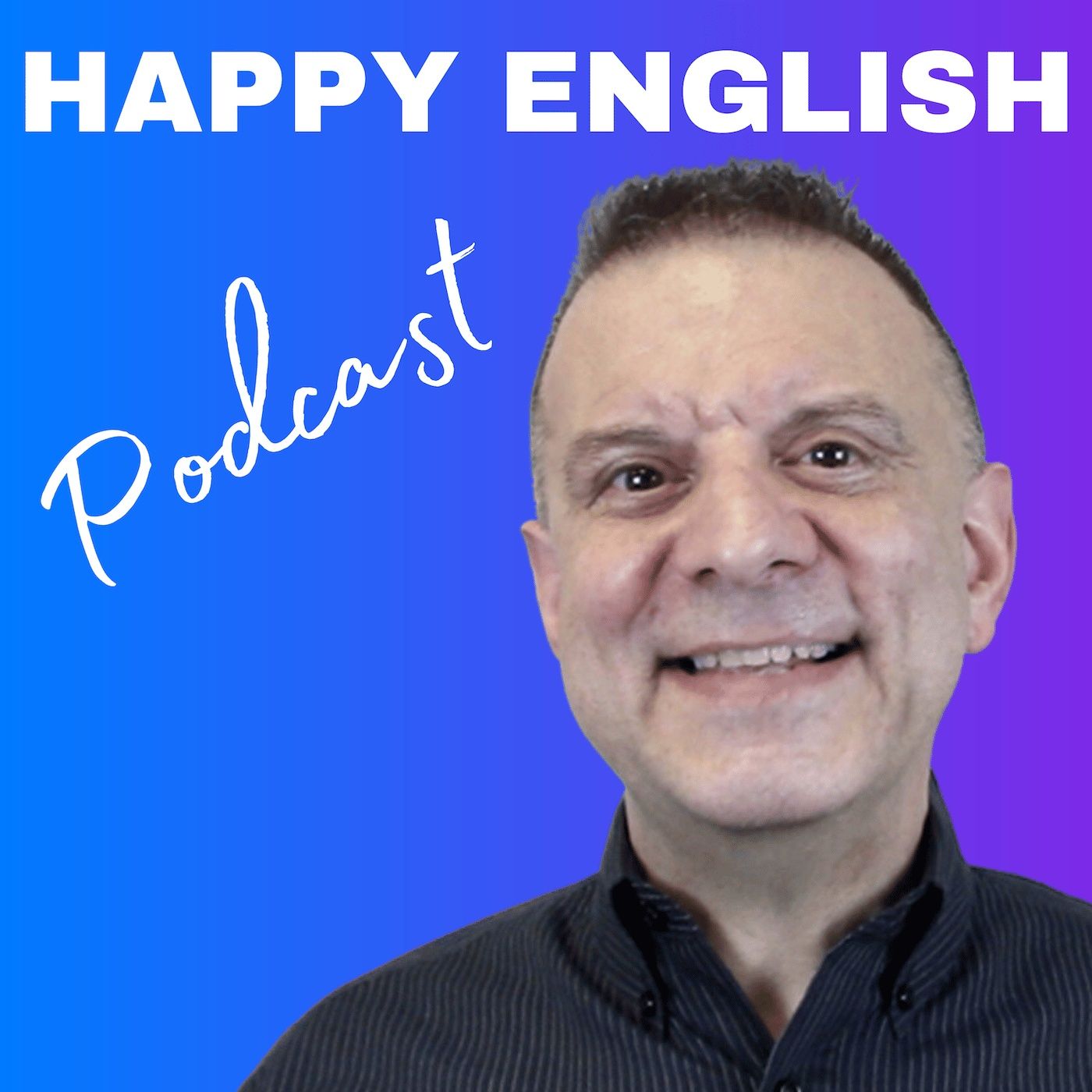Happy English Podcast
Learn American English with your host Michael DiGiacomo from Happy English in New York City. Michael has been teaching English since 1994. This is an English as a Second Language (ESL) and English as a Foreign Language (EFL) podcast that brings you fun, practical, and useful English lessons which are ideal for intermediate and advanced level English learners everywhere. This podcast is perfect for university students, business professionals, homemakers, retirees and anyone who is interested in learning and improving their English skills. Every week, you are going to learn American English idioms, conversational expressions and phrasal verbs. As your American English...
921 - Business English Idioms for Everyday Work Life

I know that I promised to keep you in the loop, so I’m touching base with you in this podcast English lesson to let you know I’ve been thinking outside the box and everything you need to improve your English is here in the pipeline.
Today, we're going to look at six of the most common idioms you’ll hear in American offices, and help you sound more natural and confident at work - or at least understand what your coworkers are saying.
Visit my website for over 3,000 free English lessons: https://www.myhappyenglish.com/
920 Sunday Speak - The Schwa Sound- The Secret to Natural Speech
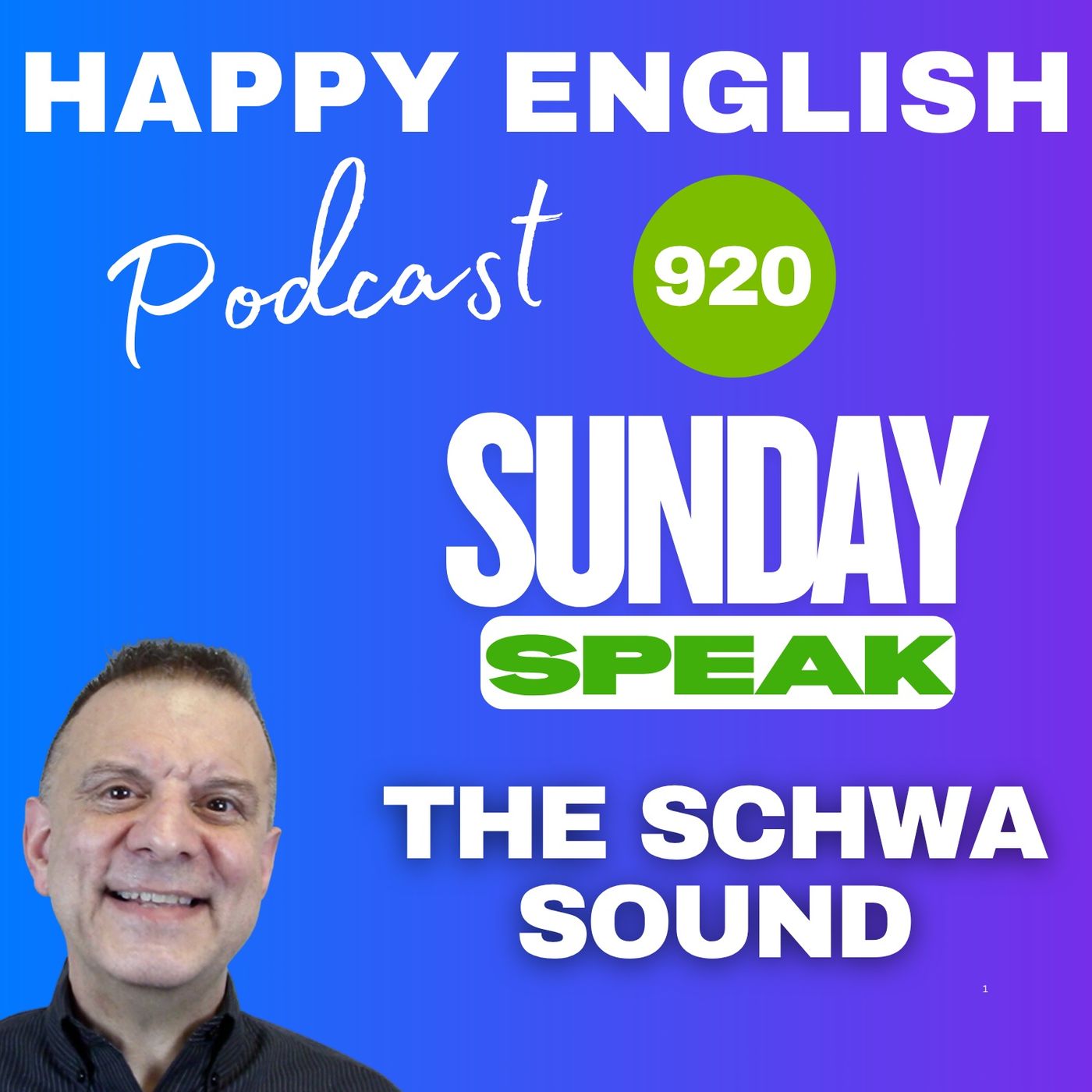
One of the biggest secrets to sounding natural in English is something called the schwa sound. It’s the most common sound in American English, and it’s a huge reason why native speakers sound so smooth and relaxed when they talk.
The schwa sounds like uh - not strong or clear, just soft and lazy: uh. We use it in many unstressed syllables and small words: Like the vowel sounds in umbrella, the a in what [whut], the i in anima [AN-uh-muhl] and the a in Sofa [SO-fuh].
Visit my website for over 3,000 free English lessons...
919 - 6-7 Is The Hottest Slang From GEN-Z

In today’s Saturday Short, Michael talks about one of the newest slang expressions to hit the English language — “6-7.”
You’ll learn where this Gen Z phrase came from, how people use it online, and why it’s more about vibe than grammar.
It’s short, fun, and a perfect look at how English keeps evolving.
So, what does “6-7” really mean? Let’s find out together!
Visit my website for over 3,000 free English lessons: https://www.myhappyenglish.com/
918 - Phrasal Verb Friday - Zone Out
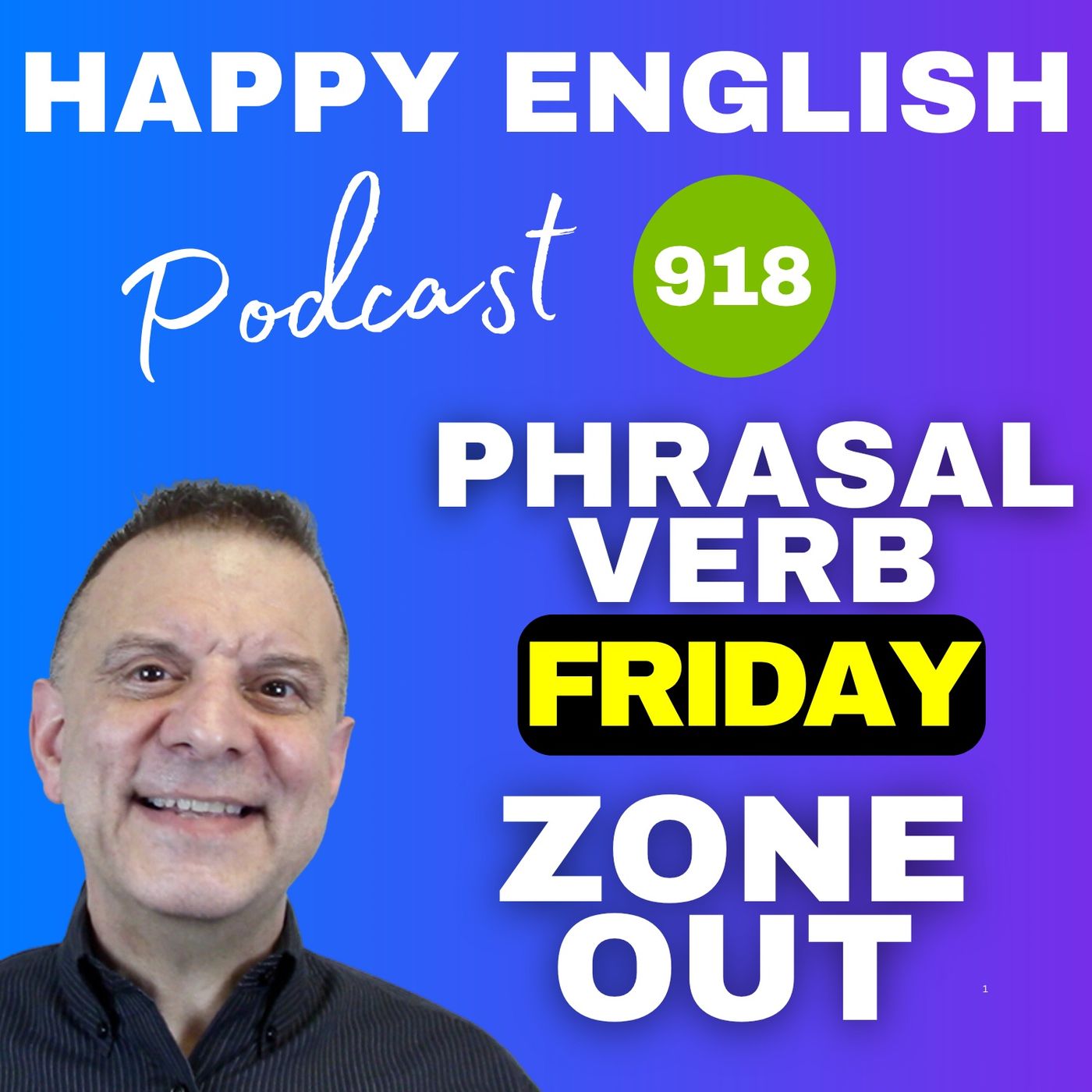
Hey there! It’s Michael here - and welcome back to another Happy English, Phrasal Verb Friday. I’m here every Friday with a quick, one-point English lesson to help you learn a new phrasal verb and sound more natural when you speak.
Today’s phrasal verb is zone out. When you zone out, it means your mind starts to wander and you stop paying attention - especially when you’re tired, bored, or distracted. Basically, your body’s there, but your brain takes a little break.
Like the other day, I was in a long meeting, and about ha...
917 - How Halloween is Really Celebrated in the USA
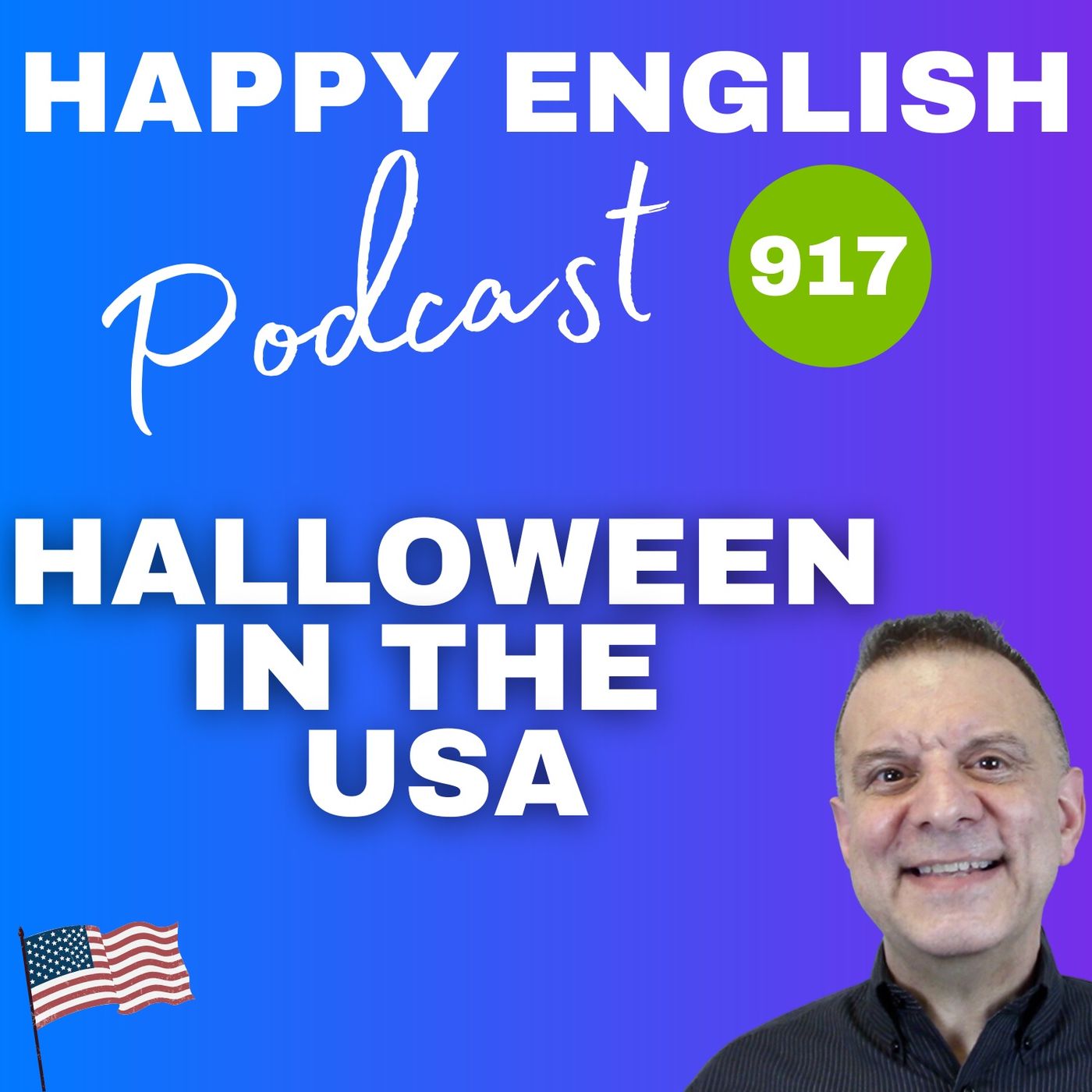
Boo! Did I scare you? I hope not. Halloween is literally right around the corner, and depending on where you live that may or may not have any particular meaning for you. But in the USA? Well, let’s go trick or treating...
Thanks for tuning in. And hey, Happy Halloween! 🎃👻 If you’re listening to this on October 31st - or even a day or two later - I hope you’re feeling the spooky season vibes. Two weeks ago, we kicked off our Halloween series with some scary vocabulary. And today, we’re keeping the Halloween spirit alive w...
916 - How to Use “Yet” in Conversations
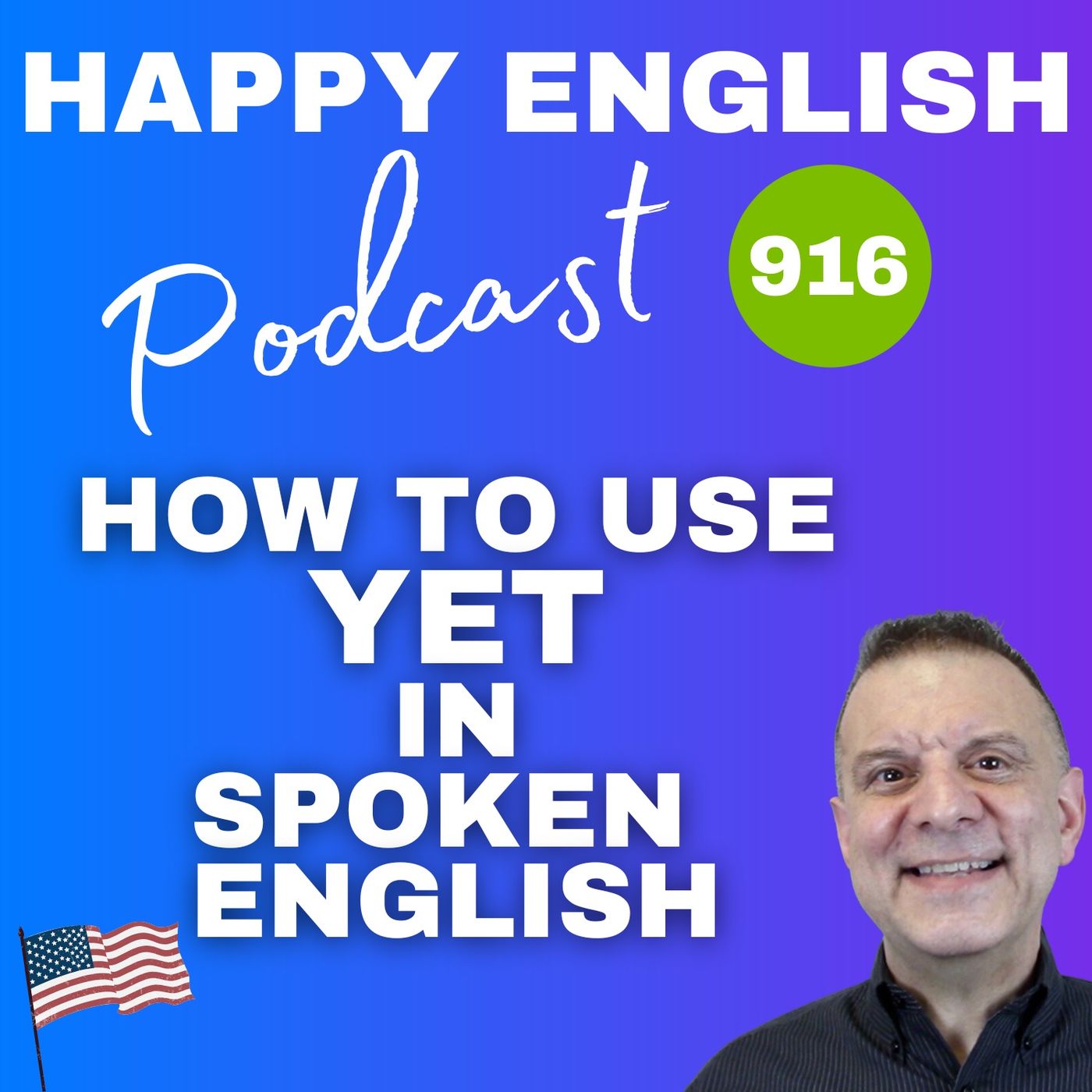
“Are we there yet?” That’s a question you’ve probably heard - or maybe even asked - especially if you’ve ever taken a road trip with kids: “Are we there yet?” “Not just yet!”
Yet is just a three-letter word, but it’s packed with meaning. It helps you talk about time, expectations, contrast, and even emphasis. And once you learn how to use yet naturally, your English is going to sound a whole lot more fluent. So today, let’s look at four of the most common ways we use yet - and I’ll show you how this tiny wor...
915 - How to Use “Get” in 5 Different Ways In English
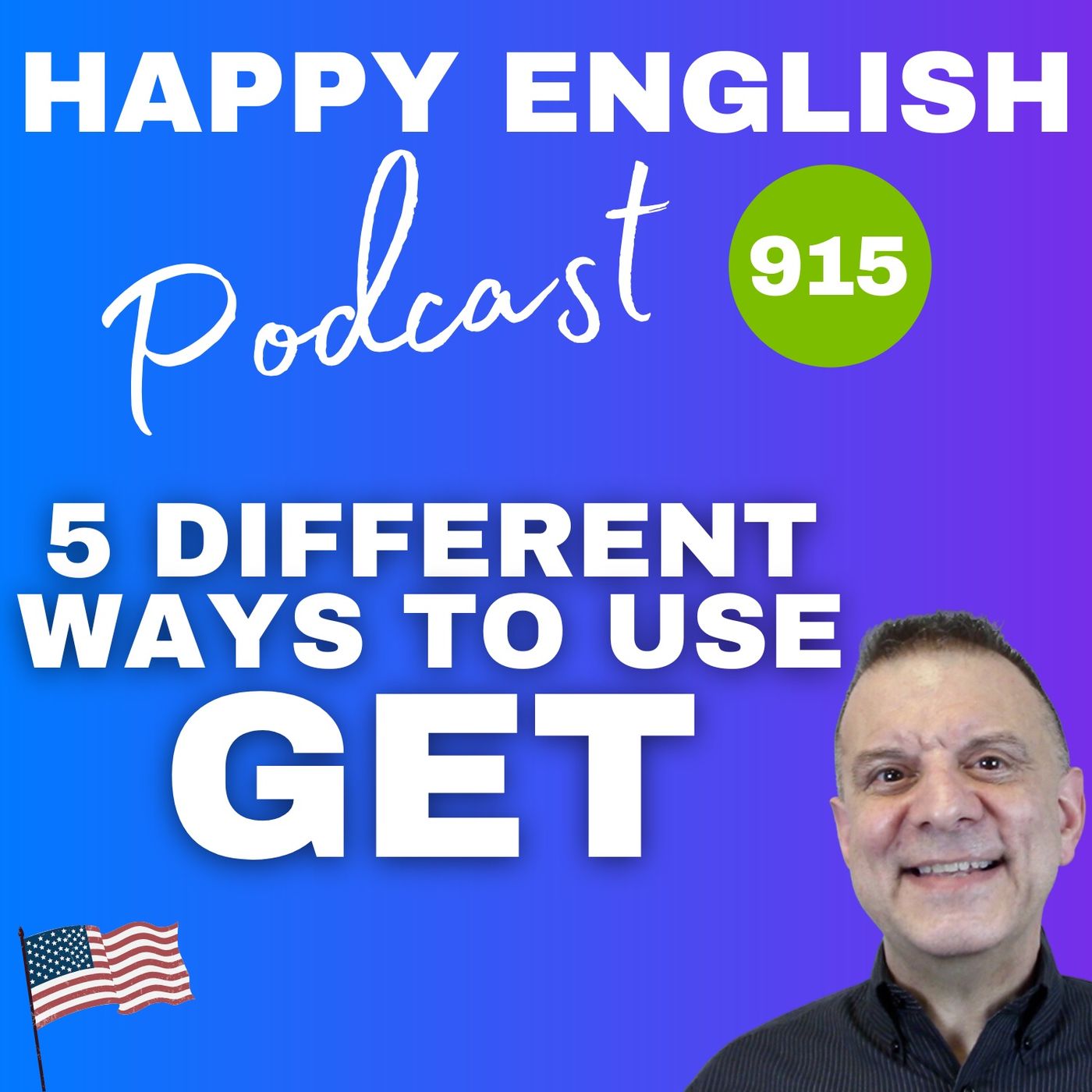
Let me ask you something - have you ever noticed how often people say get in English? I mean seriously - we get tired, we get pizza, we get better, we get going, we get caught in the rain, and we get used to the cold. Well, some of us. Get is one of the most flexible and common verbs in English - and native speakers use it all the time in conversation. So today, let’s get into it… and take a look at five of the most useful ways we use get in natural, everyday English.
Join m...
914 - Sunday Speak - Ya Didja Whaddaya - Connected Speech In American English
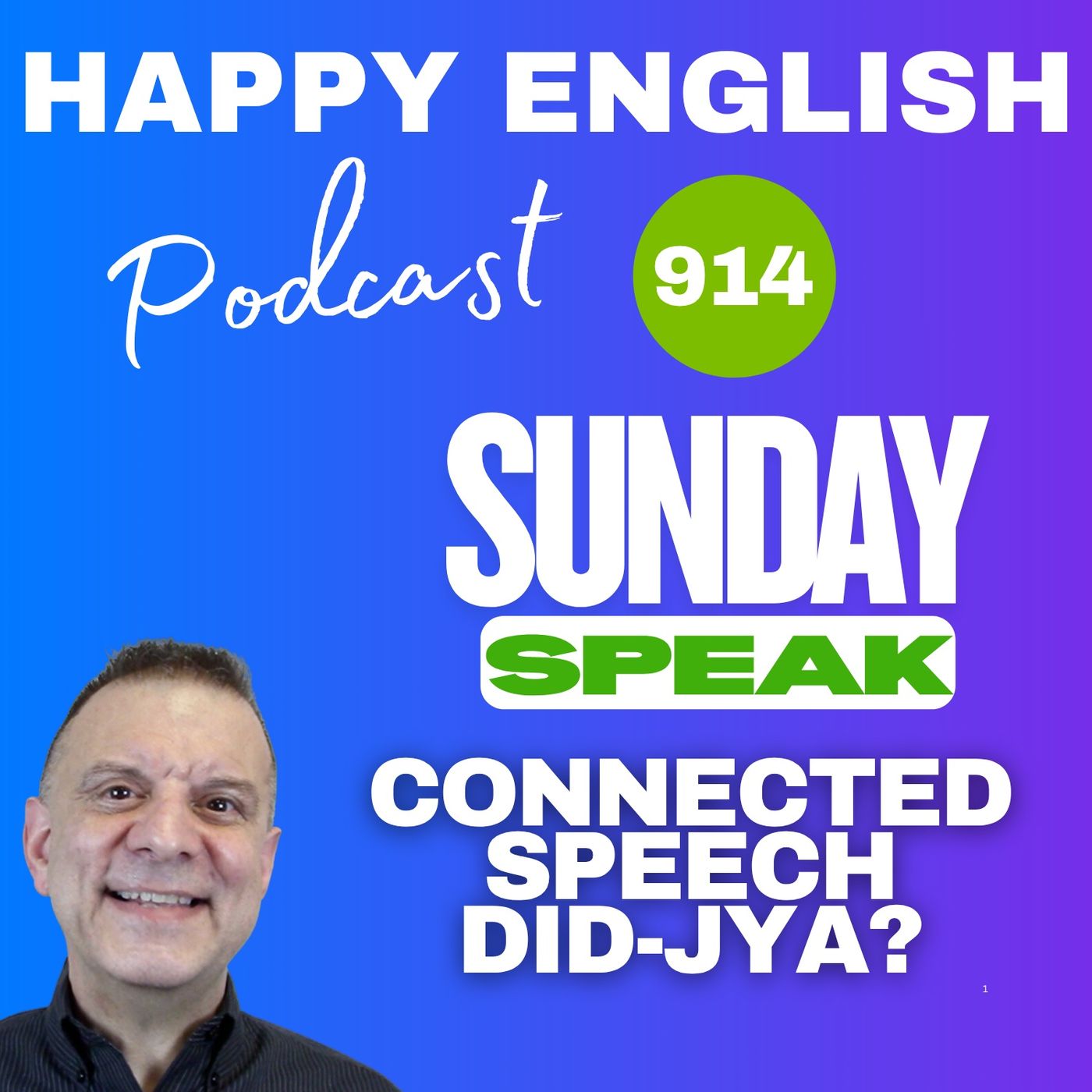
Hey there! It’s Michael here — and welcome back to another Happy English Sunday Speak. I’m here every Sunday with a quick one-point tip to help you speak English more naturally.
Now, In spoken American English, we often connect words together, and when we do, the sounds change. That’s called connected speech. You’ll hear it all the time in words and phrases like ya, didja, and whaddaya.
So instead of saying “Do you”, Americans usually say “d’ya” or just “ya.” “Do you like sushi?” → “D’ya like sushi?” or “Ya like sushi?”Instead of “Did you”, we say “didja.” “Did you see...
913 - Saturday Short - You Know What? Guess What?
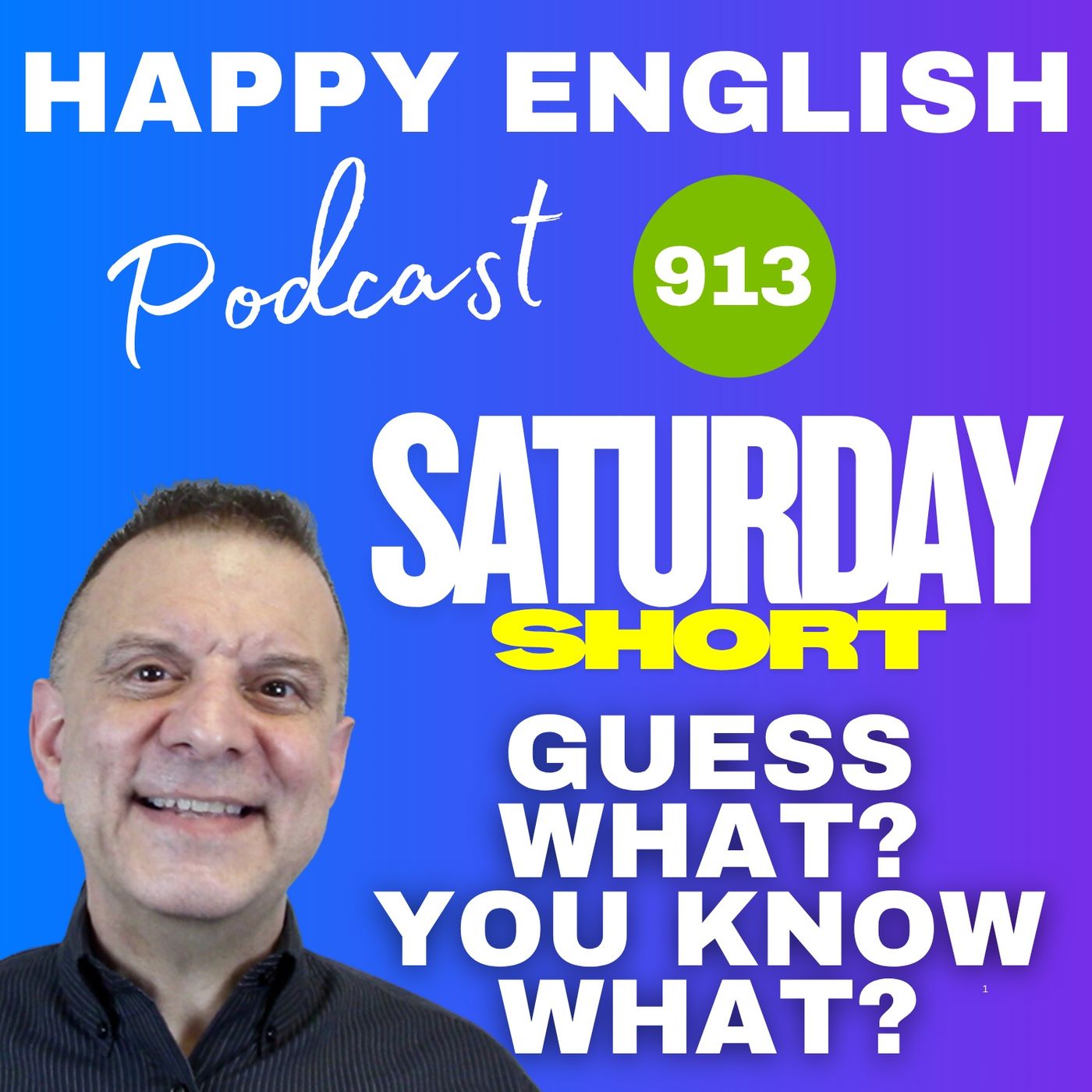
Hey there! It’s Michael here, and welcome back to another Happy English Saturday Short, your quick tip for speaking English better.
Today, let’s look at two really common and super natural phrases you’ll hear in everyday English: “You know what?” and “Guess what?” We use both of these when we want to grab someone’s attention - usually before we share some news, an idea, or an opinion. They make your speech sound lively and conversational and they’re kind of like how we say, “Hey, listen to this!”
Like: “You know what? I think I’m finally getti...
912 - Phrasal Verb Friday - Buckle Down
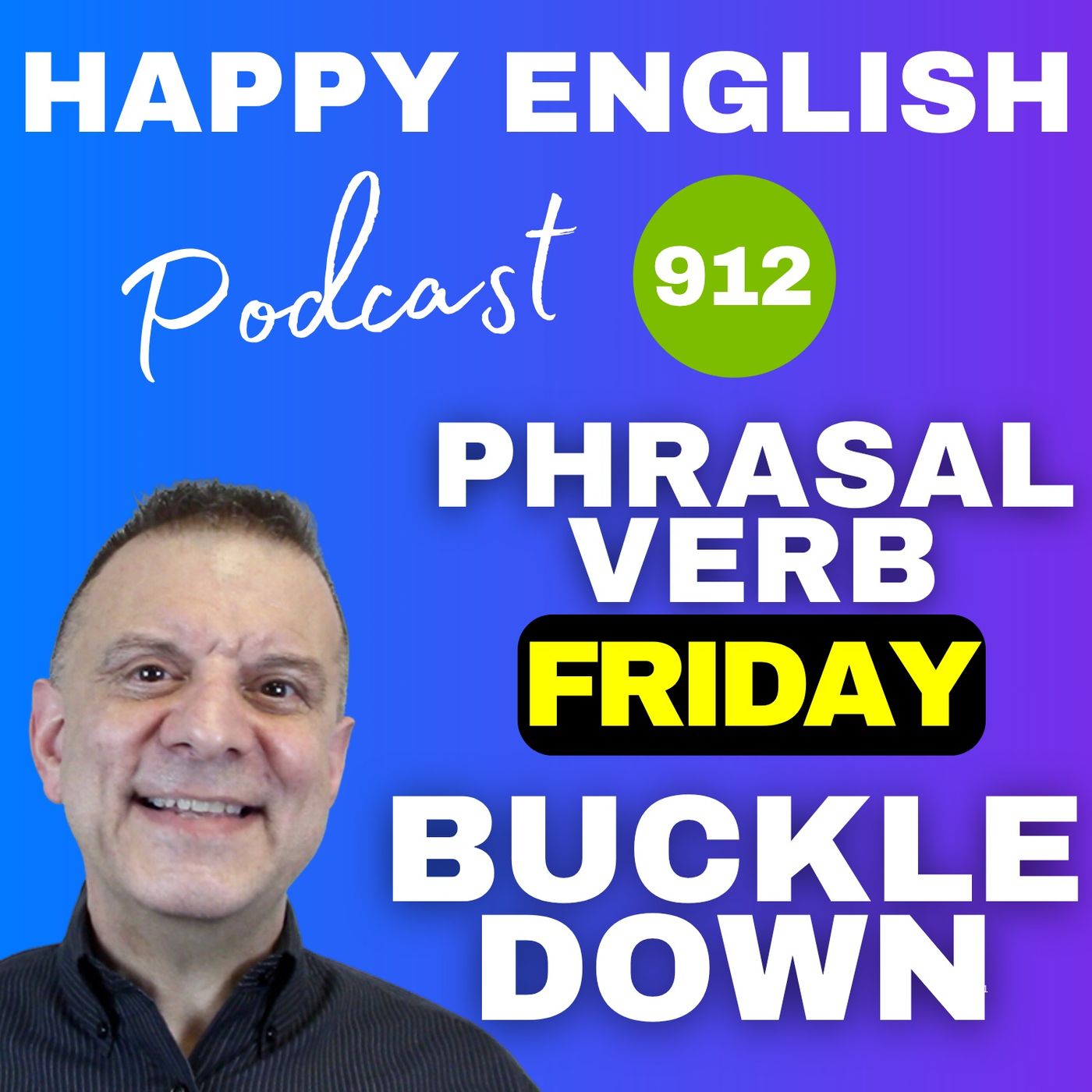
Hey there! It’s Michael here — and welcome back to another Happy English, Phrasal Verb Friday. I’m here every Friday with a quick, one-point English lesson to help you learn a new phrasal verb and sound more natural when you speak.
Today’s phrasal verb is buckle down. When you buckle down, it means you start working seriously and with focus — especially after being a bit lazy or distracted. You stop wasting time and get things done. And we tend to say, buckle down and DO somerthing.
Like my buddy Kevin. He was having fun all summer, but...
911-Understanding And Using The Subjunctive Mood In English
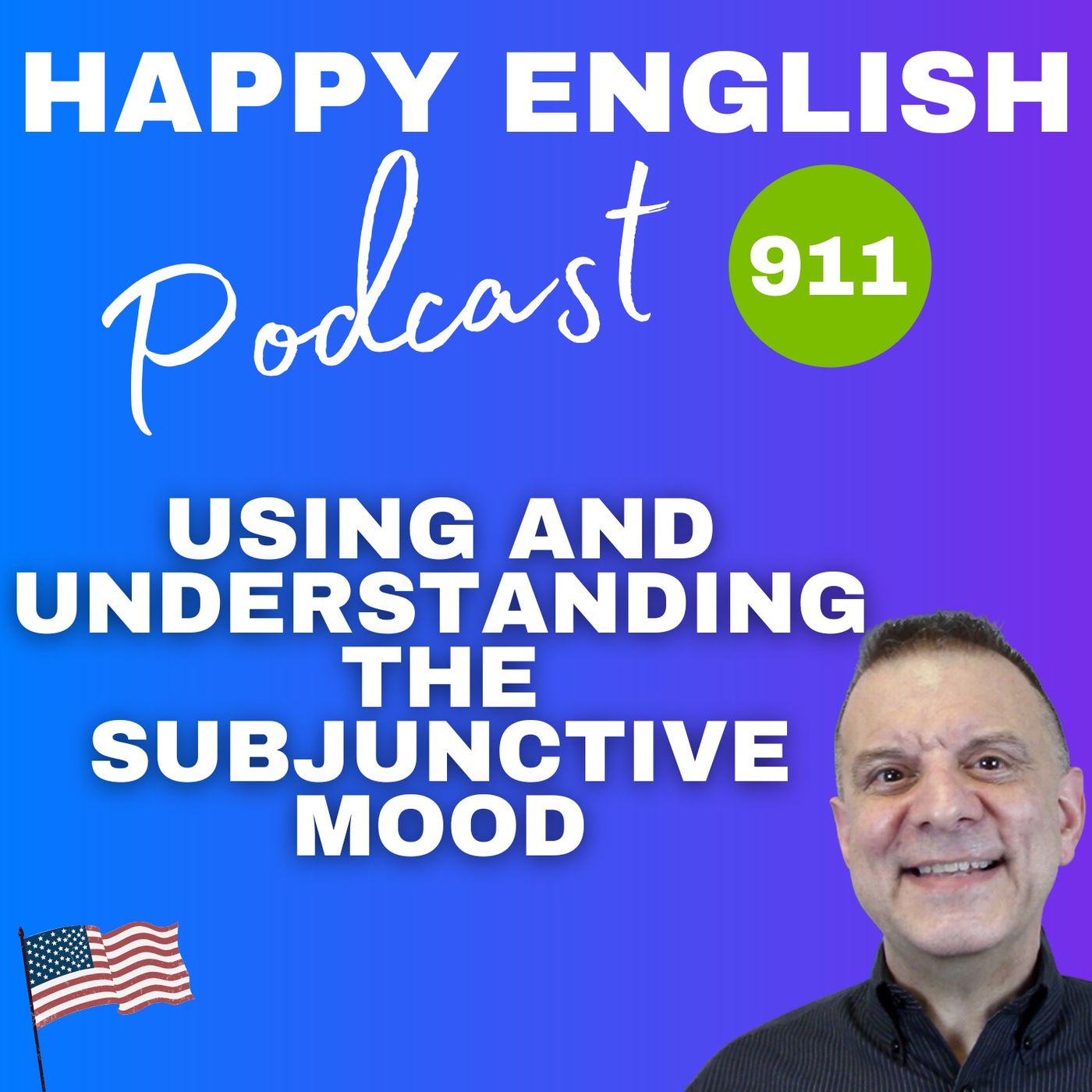
I suggest you listen carefully to this podcast. And if you’re with a friend right now, I suggest he listen carefully as well. Or she listen carefully. I mean, if I were you, I’d definitely stick around for this one.
Today we’re diving into a part of English grammar that doesn’t follow the usual rules - but native speakers use it all the time without thinking twice. Especially in American English. It’s called the subjunctive mood - and while that might sound technical or tricky, it’s actually pretty simple once you know how it works...
910 - How To Use Should, Wish, And If Only To Express Regret In English
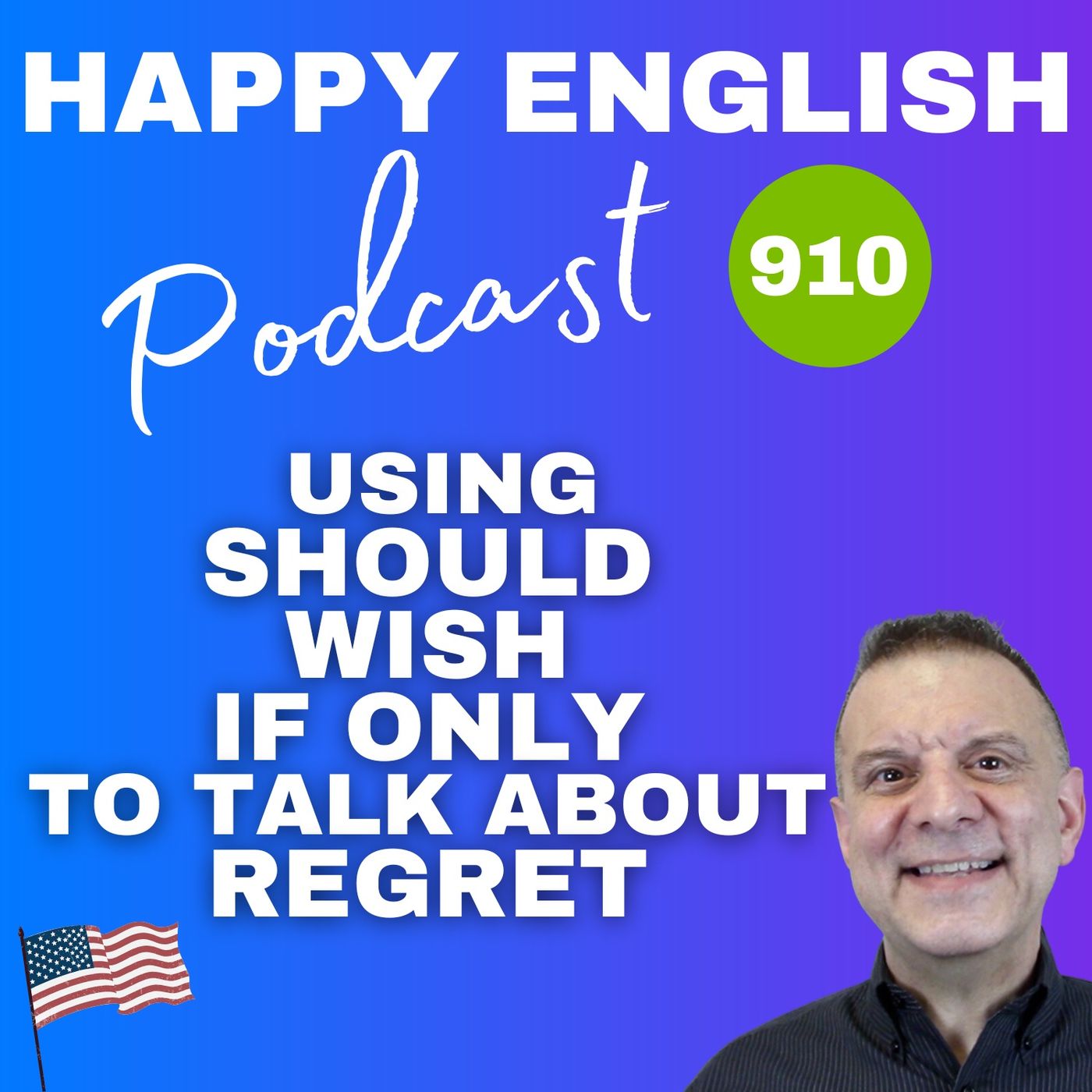
Hey, let me ask you a question - have you ever made a decision… and then later thought, “Oh man, I shouldn’t have done that”? Or maybe you’ve thought, “If only I had done it differently.” Yeah. That, my friend, is regret - and we all feel it sometimes. Regret is one of those universal emotions - something everyone experiences. And in English, we’ve got a few really natural and emotional ways to talk about it. So today, I’ll show you how to use phrases like “I should have,” “I wish I had,” and “If only I had” - plus some everyday...
909 - Sunday Speak - The American Flap T Pronunciation
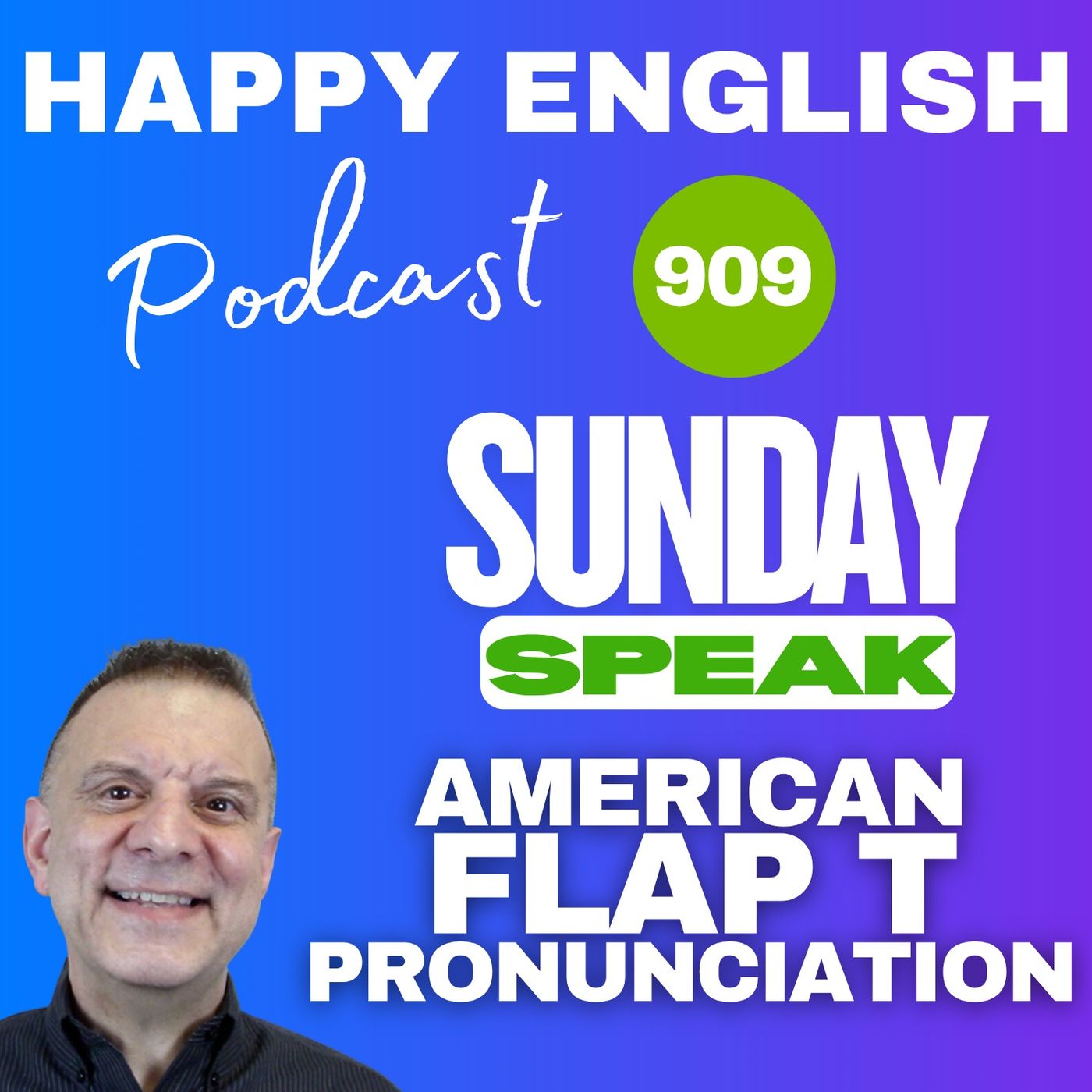
Hey there! It’s Michael here - and welcome back to another Happy English Sunday Speak. I’m here every Sunday with a quick one-point tip to help you speak English more naturally.
Now, in American English, there’s a special sound we make with the letter T. It’s called the flap T, and it sounds kind of like a soft D sound. You’ll hear it in words like better, water, and pretty. So instead of saying “BET-ter,” “WAH-ter,” and “PRIT-ty,” Americans usually say “BEH-der,” “WAH-der,” and “PRI-dee.” This sound happens when the T comes between two vowel sounds — like the a and e...
908 - Saturday Short – Learn To Use The Conversational Phrase, You Know What I Mean?
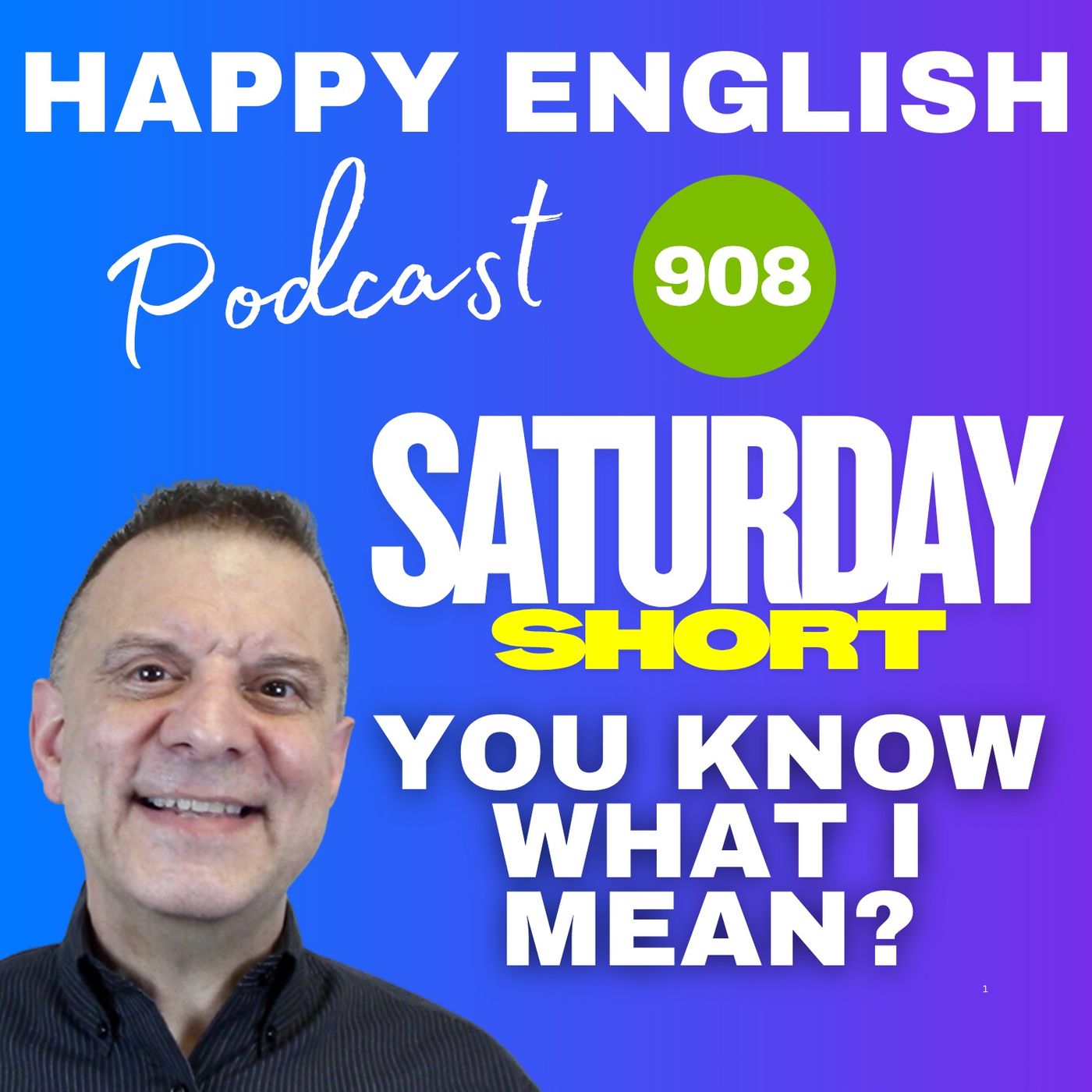
Hey there! It’s Michael here - and welcome back to another Happy English Saturday Short, your quick tip for speaking English better.
Today, let’s look at a super common phrase you’ll hear in everyday English: “You know what I mean?” We use you know what I mean? to seek agreement or to check if the other person understands us. It’s kind of like soft tag questions, like isn’t it? that keeps the conversation friendly and connected.
Like, in the office, you might say: “There’s something strange about the new marketing manager, you know wh...
907 - Phrasal Verb Friday - Meaning and Usage Of Flake Out In English
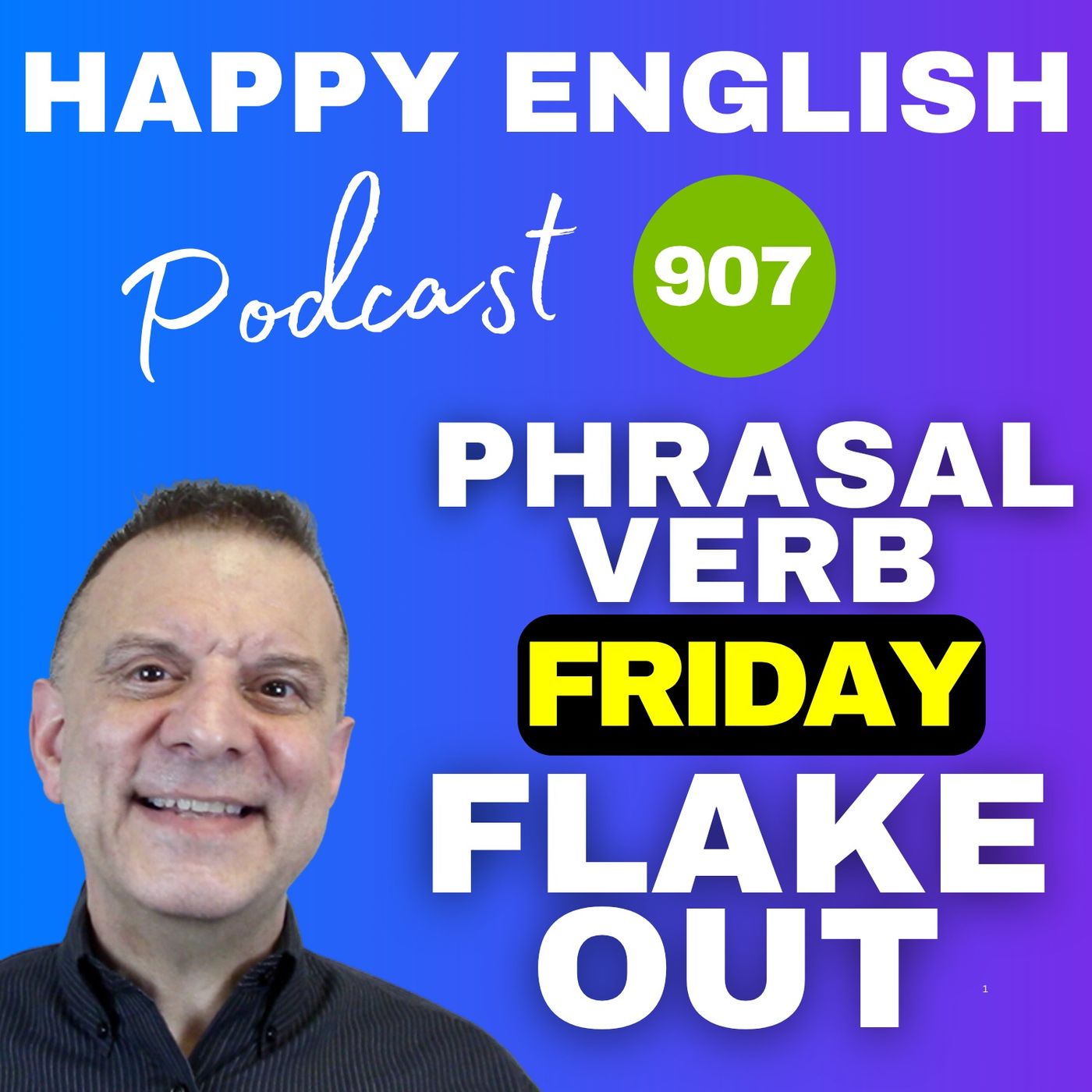
Hey there! It’s Michael here - and welcome back to another Happy English, Phrasal Verb Friday. I’m here every Friday with a quick, one-poi nt English lesson to help you learn a new phrasal verb and sound more natural when you speak.
Today’s phrasal verb is flake out. When you flake out, it means you agree to do something - like meet up, help out, or join an event - but then you don’t show up or don’t follow through. Basically, you cancel or disappear at the last minute.
Like last weekend. My friend Ja...
906 - How to Use ‘By’ in English - Time, Deadlines, and Authorship Explained
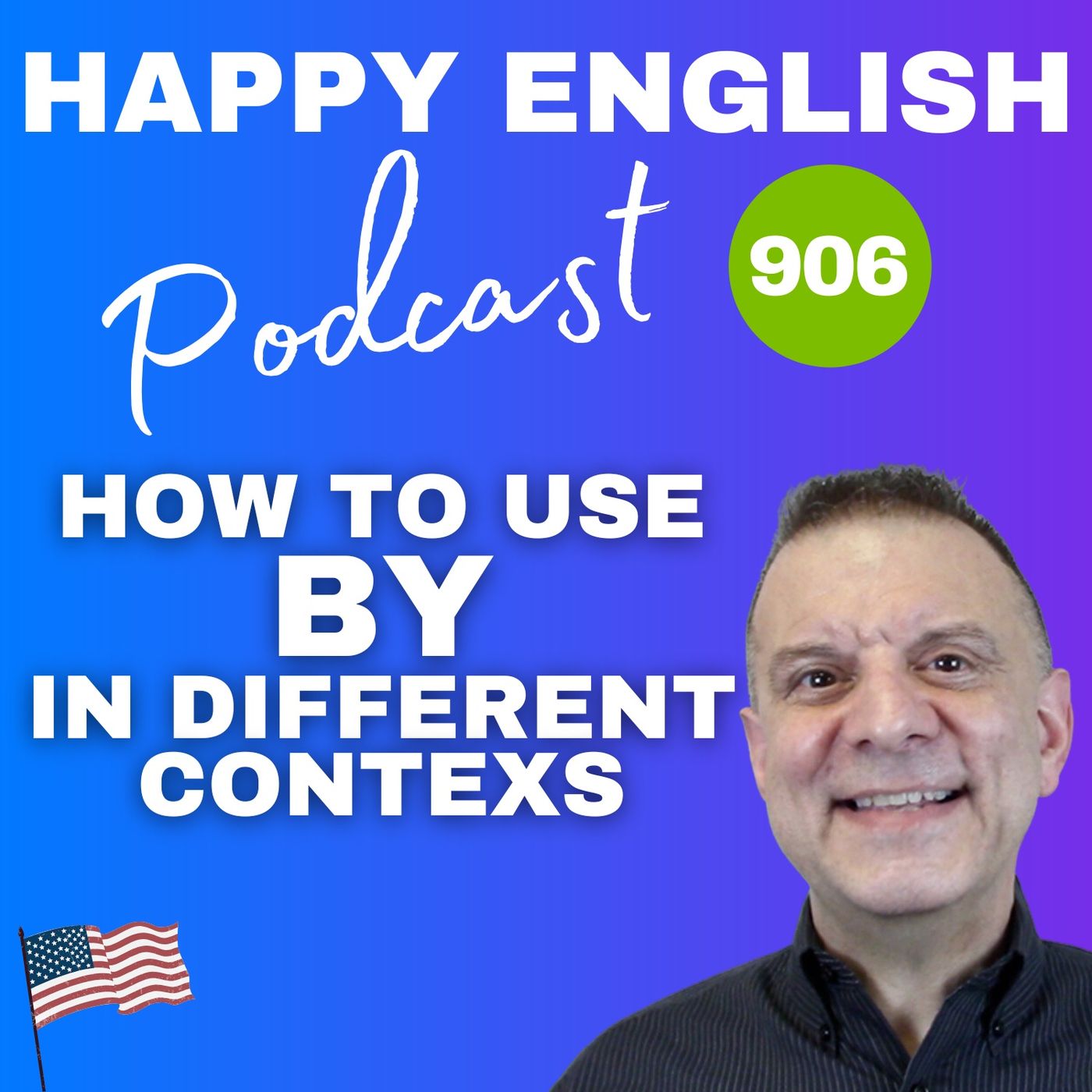
Welcome - and by the way - thanks for stopping by today! I’ve been thinking… by is one of those little words that shows up everywhere in English. It’s just two letters, but it does a lot of work.
Today we’re gonna take a close look at by - and I think you’ll be surprised at how many different ways we use it. You’ve probably seen BY in phrases like “by the time I got there,” or “a book by Hemingway,” or even “I’ll finish it by Friday.” Yeah - by is short, but powerful. Time, l...
905 - Creepy, Spooky, and Downright Scary - Halloween Words in English
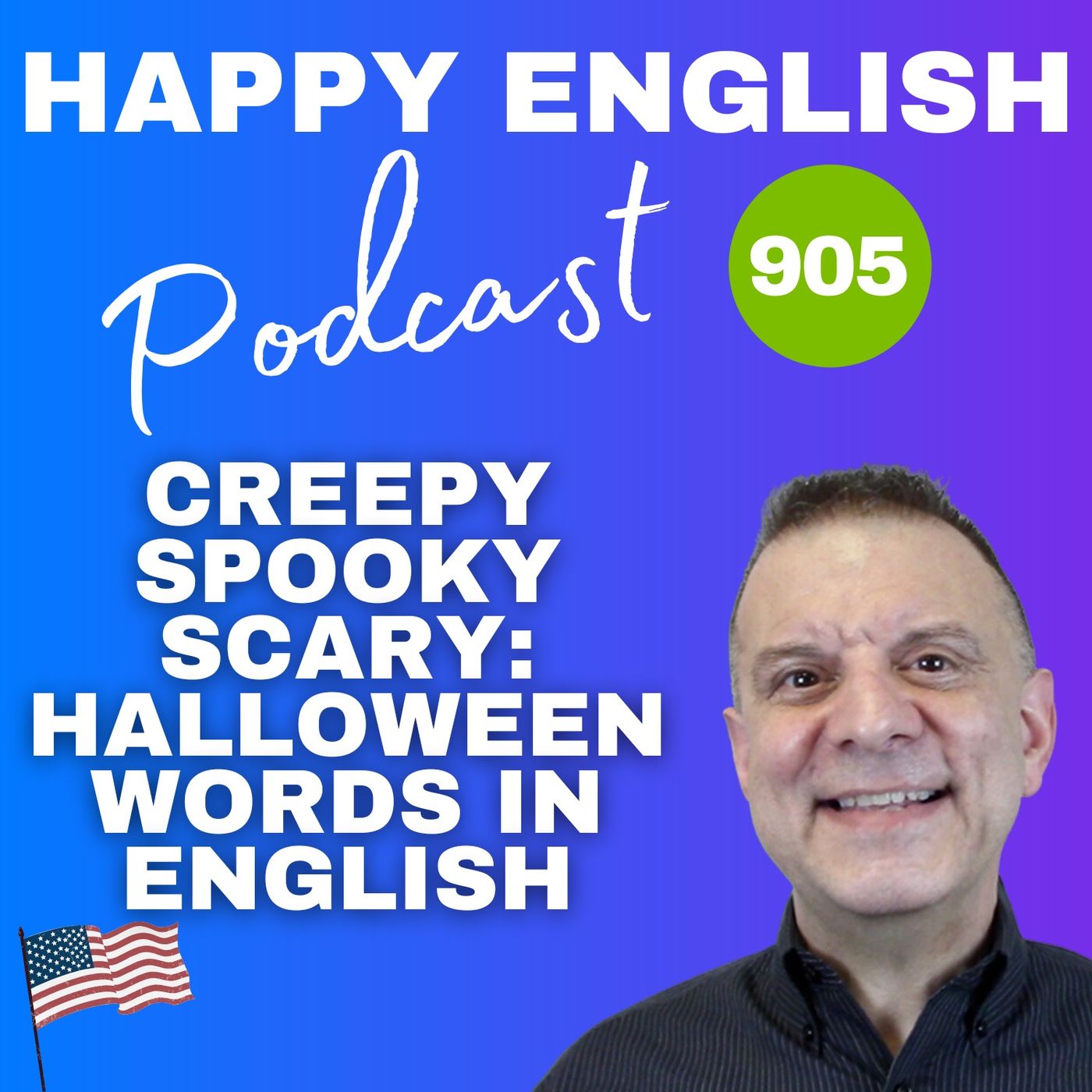
With Halloween right around the corner, I thought it’d be fun to do a little Halloween-themed English. So for the next three weeks, we’re going to dive into some spooky vocabulary, creepy idioms, and even take a look at how Halloween is celebrated in the U.S. Let’s kick it off today with something super useful - Halloween vocabulary! Now, you might be thinking, “Michael, I’m not a fan of horror movies.” That’s totally fine! But you know what? These words aren’t just for Halloween. Native speakers use them in everyday conversation - often in a humorous or exa...
904 - How come we can say foods, hairs, and freedoms?
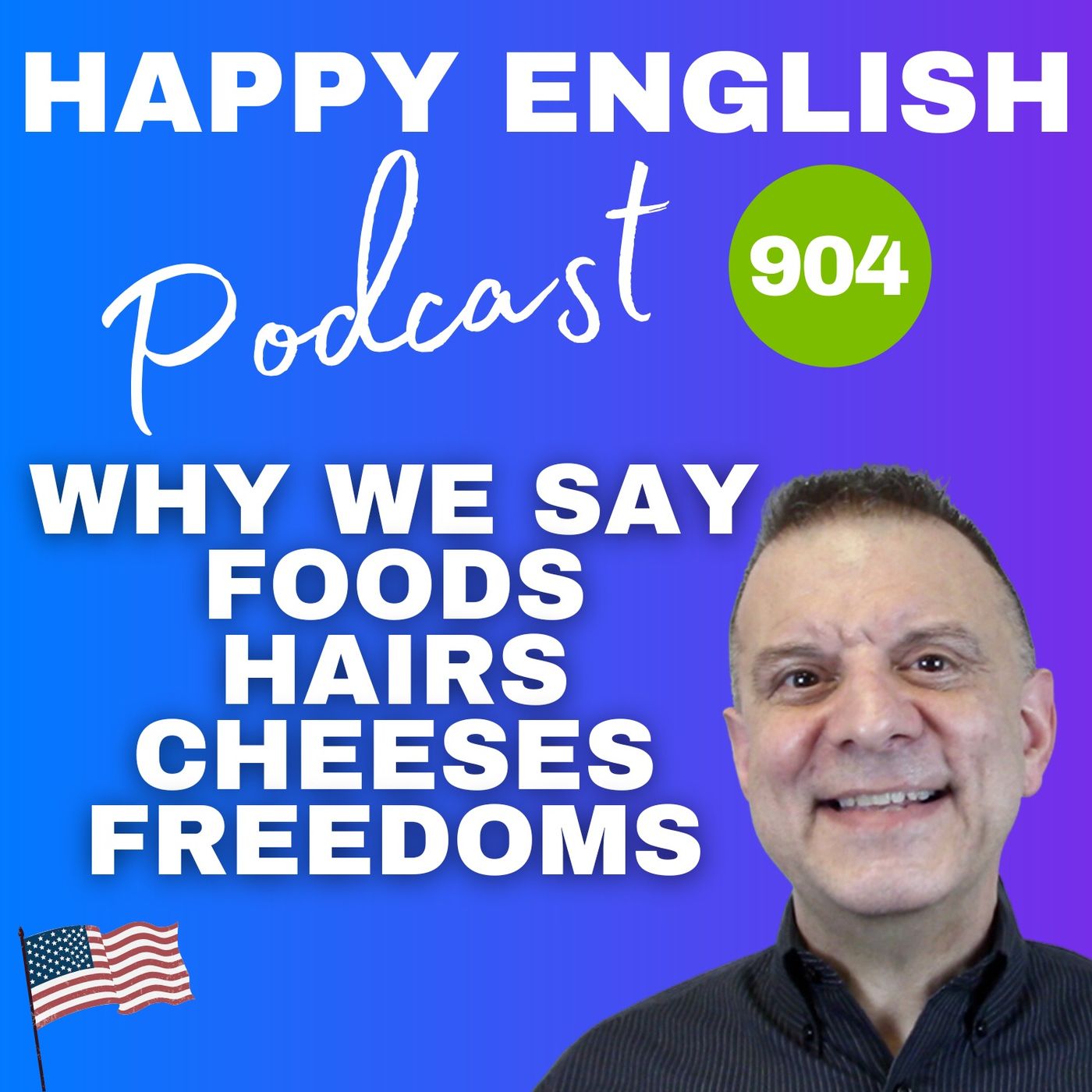
Did you know? Eating healthy foods can make you healthy, but I heard that drinking certain wines with cheeses can make you happy. Foods? Wines? Cheeses?
You know, English is a strange language sometimes. Like, words that are usually uncountable suddenly show up with an “s” on the end. Like…foods, cheeses, and wines? Wait a minute — aren’t those uncountable nouns? Well… yes! But also… no. Let me show you how it works — and why it actually makes a lot of sense once you understand the pattern.
Join my Podcast Learner's Study Group here: https://www.myhappyengli...
903 - Sunday Speak - Use "I Dunno" To Sound More Natural
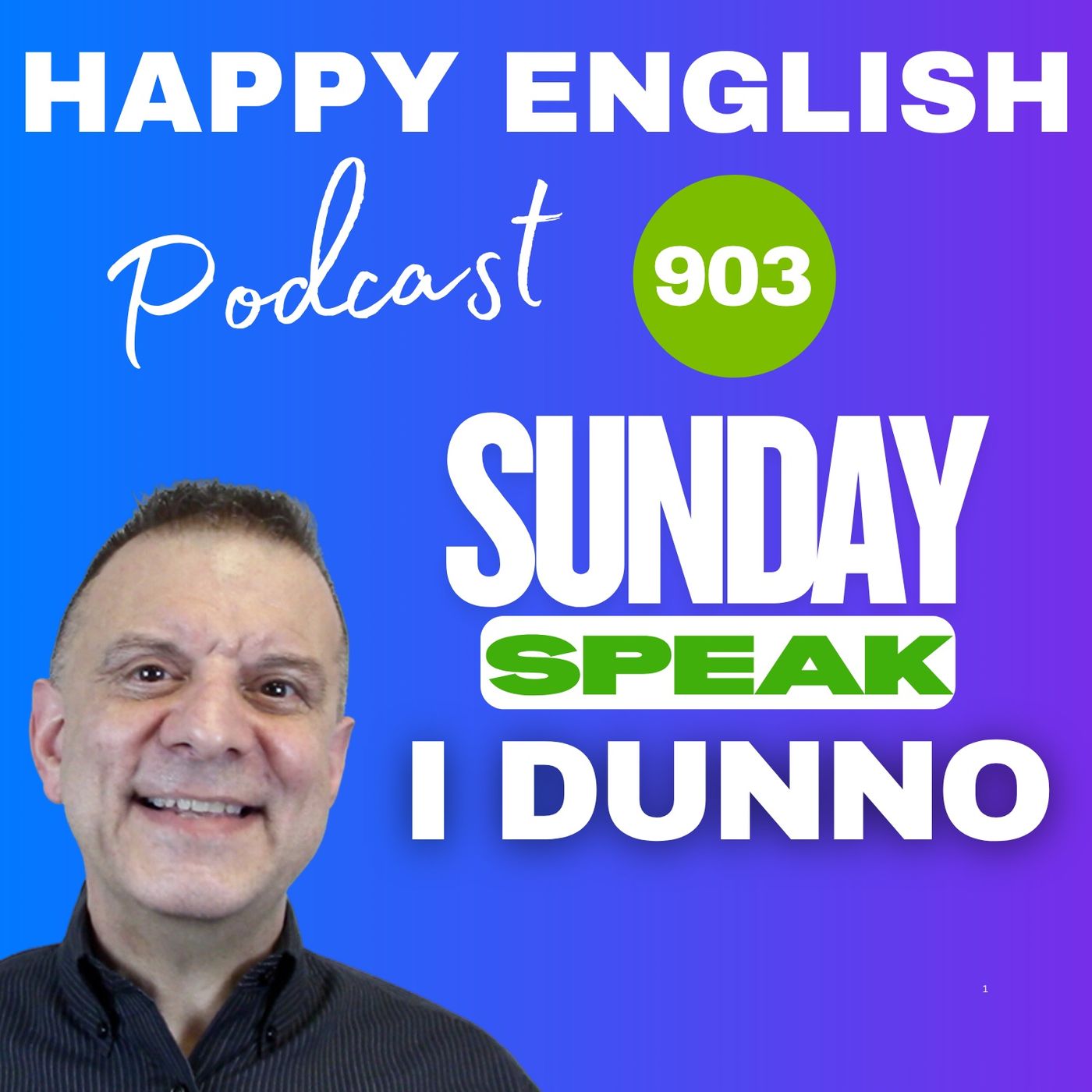
Hey there! It’s Michael here — and welcome back to another Happy English Sunday Speak. I’m here every Sunday with a quick one-point tip to help you speak English more naturally.
Now, one of the most common phrases in English is “I don’t know.” But in everyday conversation, most native speakers don’t pronounce each word clearly like that. Instead, we usually say “I dunno.” (“EYE-duh-NO”) That’s right — I don’t know becomes I dunno. It’s just a natural sound change that happens when we speak quickly.
“Who’s coming to the party?” → “I dunno.” “What time does the movie start...
902 - Saturday Short - How To Use Let Me Tell You Something In English
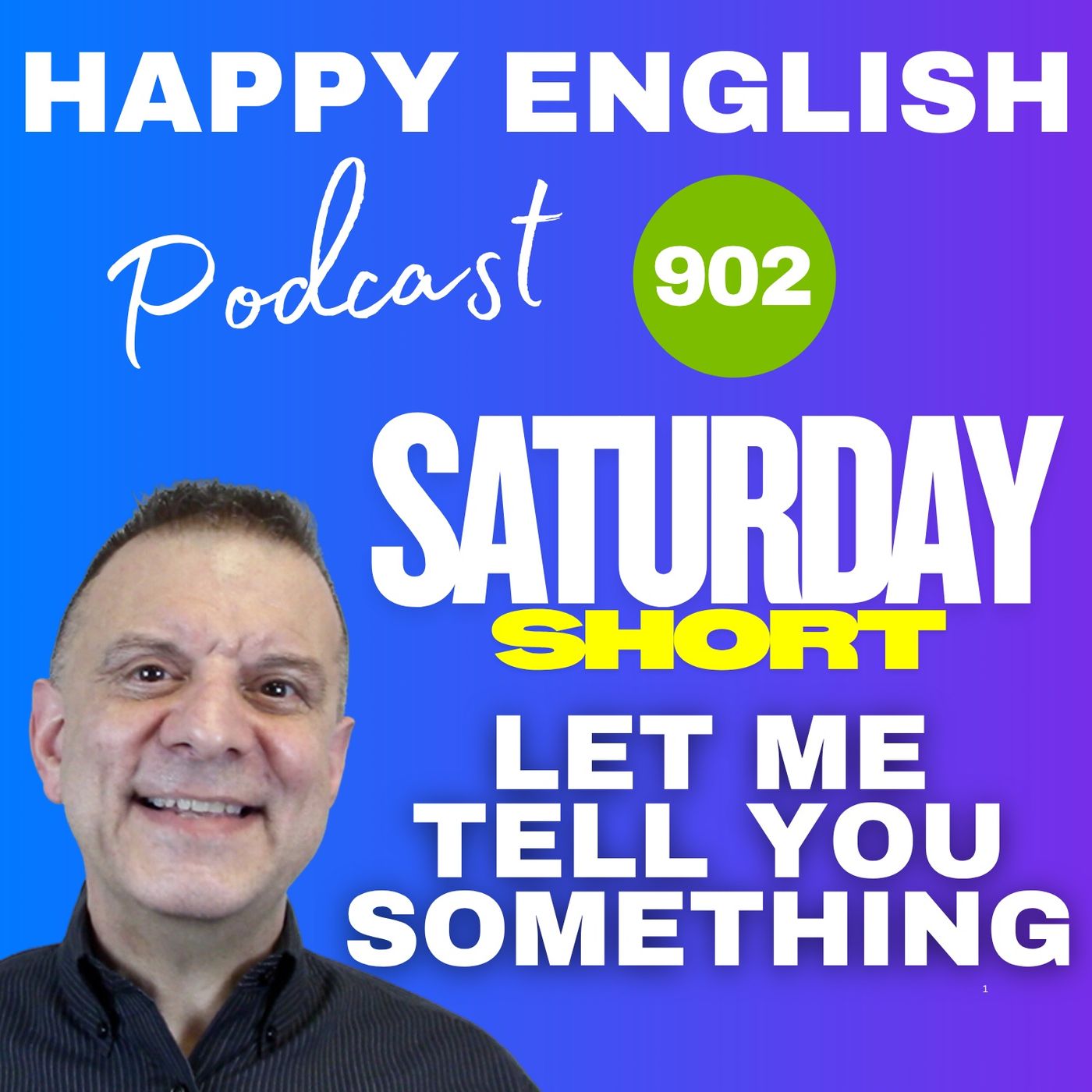
Hey there! It’s Michael here and welcome back to another Happy English Saturday Short, your quick tip for speaking English better.
Today, let’s look at a really common and powerful phrase: “Let me tell you something.” We use let me tell you something when we want to share our feelings, give an opinion, or emphasize what we’re about to say. It helps grab the listener’s attention and makes your speech sound more natural — and more emotional.
Let’s say your friend just ask you about a new restaurant in town. You could say:
“Oh...
901 - Phrasal Verb Friday - Meaning and Usage of Crank Out In English
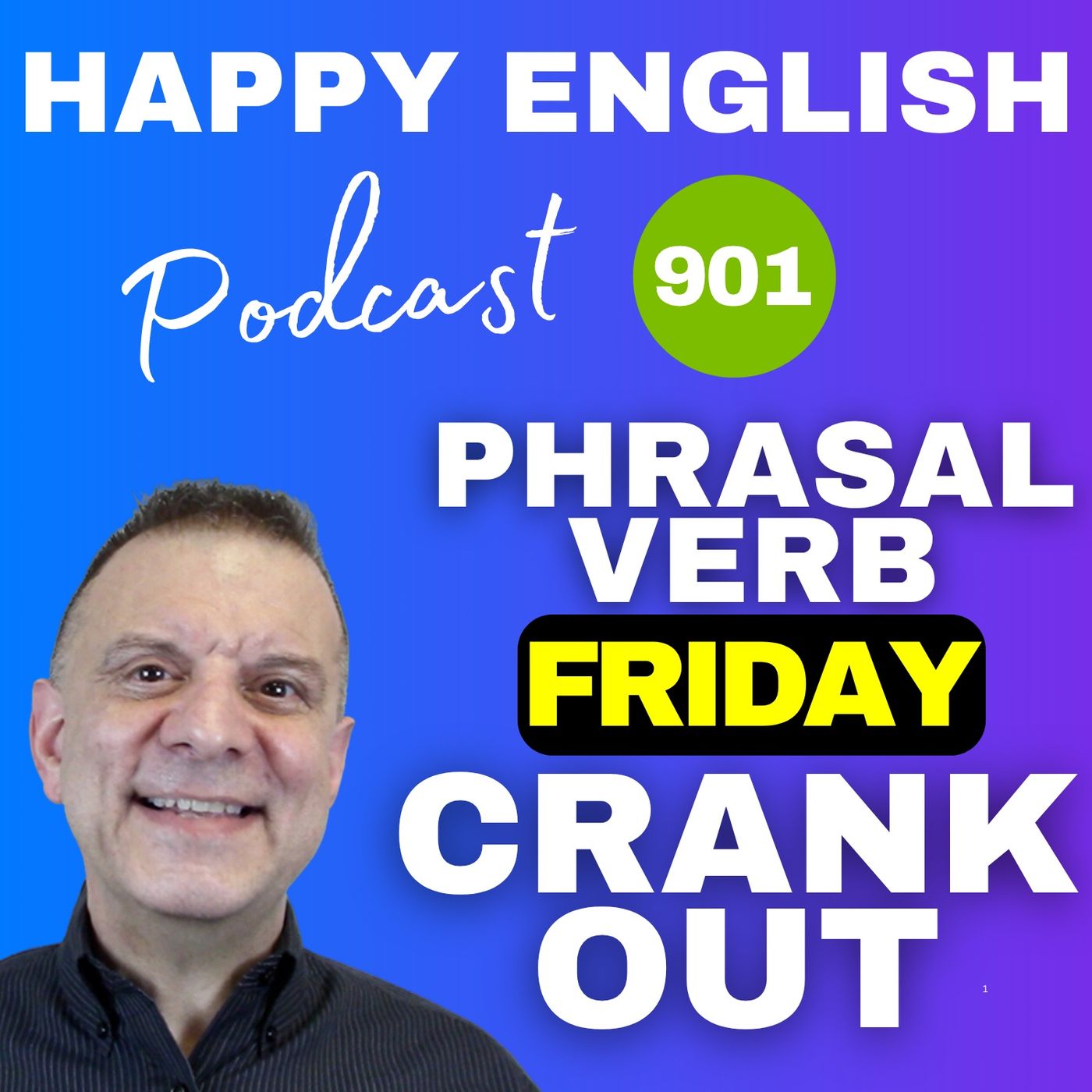
Hey there! It’s Michael here — and welcome back to another Happy English, Phrasal Verb Friday.
I’m here every Friday with a quick, one-point English lesson to help you learn a new phrasal verb and sound more natural when you speak.
Today’s phrasal verb is crank out. When you crank something out, it means you produce it quickly, often in large amounts. This phrase is often used for things like writing, work, or manufacturing — anything that can be produced at a fast pace, sometimes with a focus on quantity over quality.
The factory in the next t...
900 - Thank You, and What I’ve Learned From 900 Podcasts
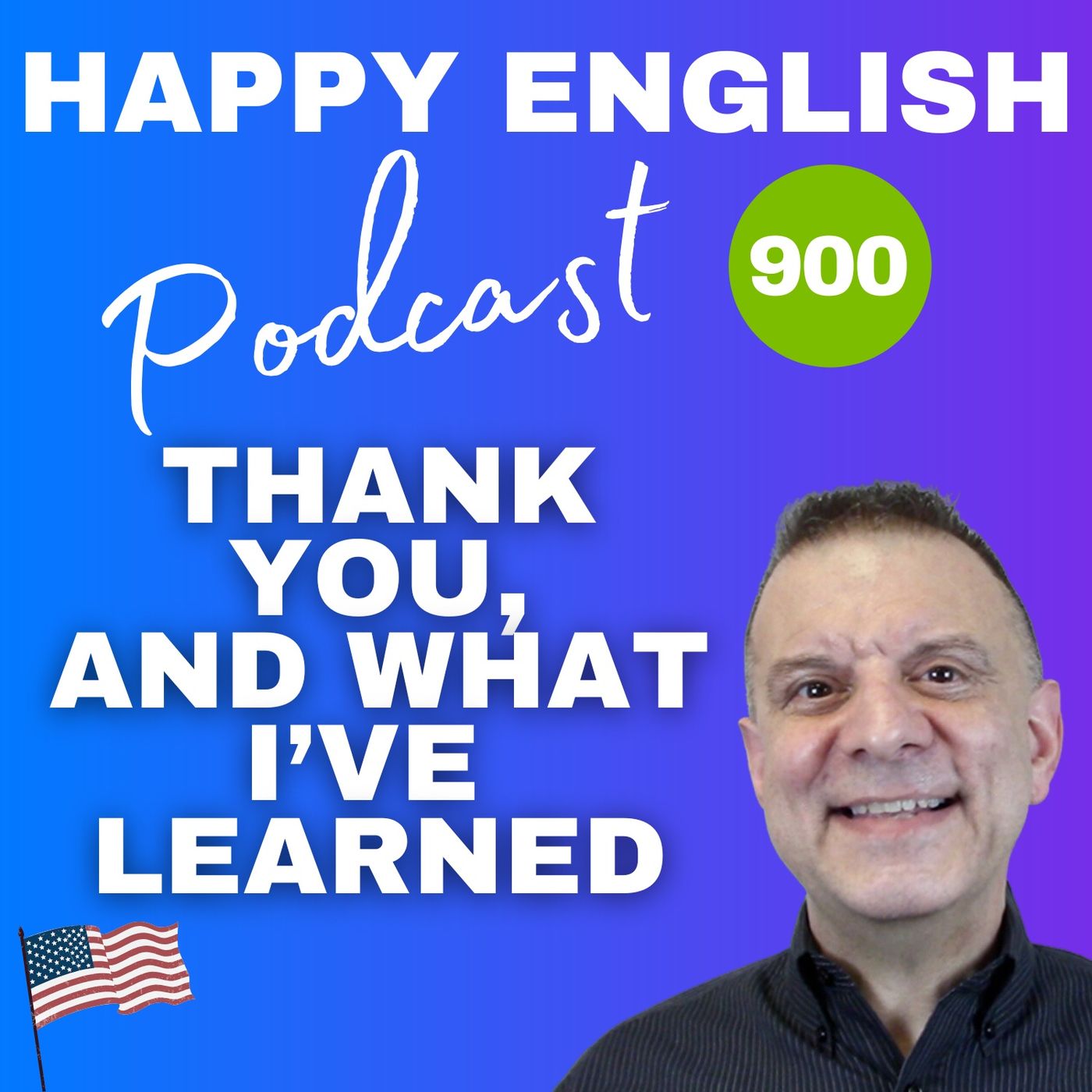
Hey, can you believe it? This is Episode 900 of the Happy English Podcast. Nine. Hundred. Episodes. I can hardly believe it myself. Here’s what I’ve learned along the way!
I just want to take a moment today to say how grateful I am to YOU. Whether this is your first time listening, your 50th time, or you’ve been here since Episode 1, thank you. The fact that you listen, learn, and grow with me is what keeps me showing up here week after week. So today, I want to share a little bit of my story, what I...
899 - How to Use 'Ain’t' in Real English Conversation
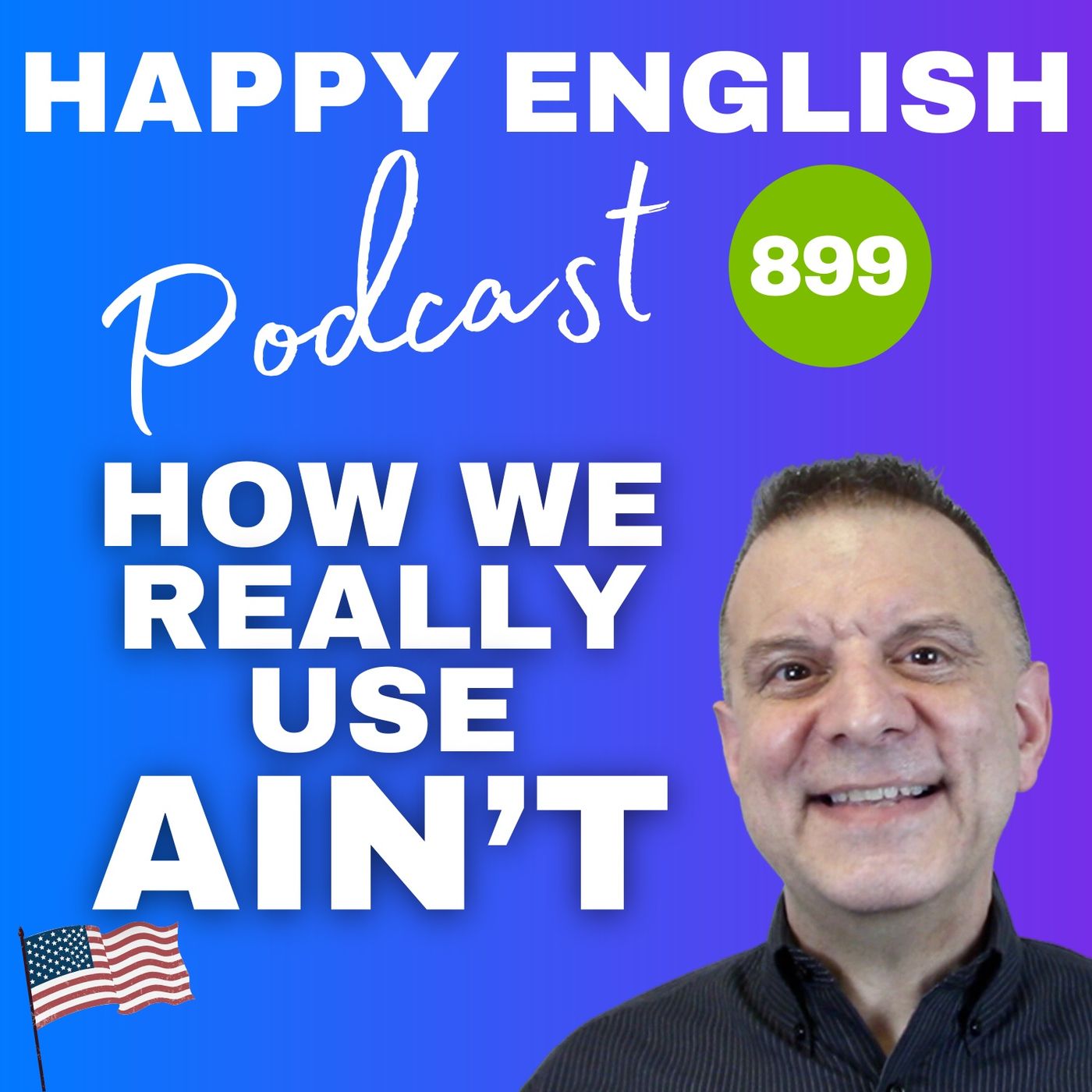
Here’s a question. Have you ever heard someone say ain’t in a song or a movie? Like, or “I ain’t got no time for that”? Maybe you wondered… is ain’t actually English? Well, it sure ain’t in the textbooks, but it is in real life! And I ain’t kidding.
Today we’re diving into a word that confuses a lot of English learners - ain’t. It’s not considered “standard” grammar, but that doesn’t mean it’s wrong. In fact, native speakers use ain’t all the time in casual, spoken English, and especially in m...
898 - 4 Ways To Use So In English
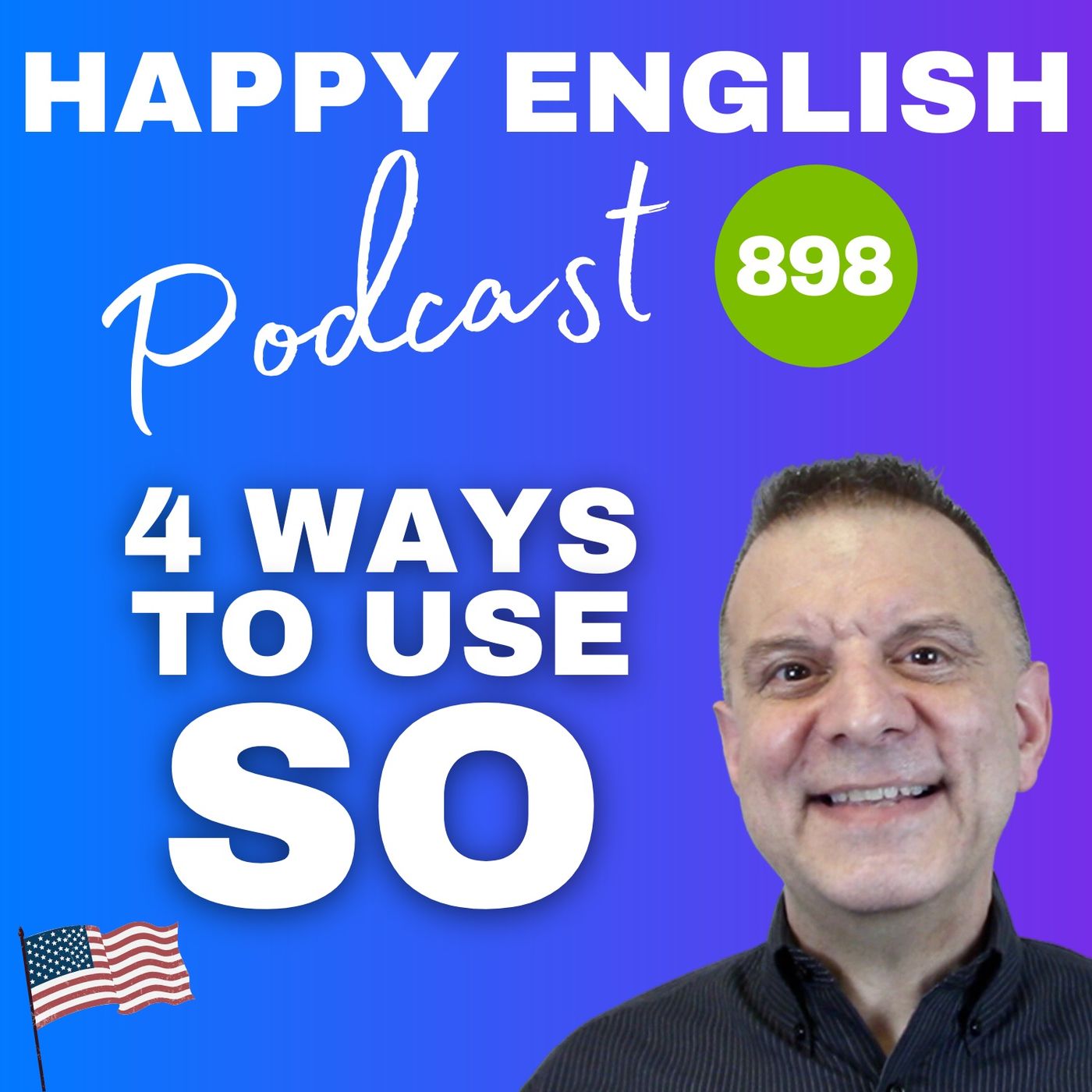
You know, I started this podcast in 2014 so I can help people speak English better. And now, there are so many podcast episodes, It’s almost near a thousand. So, check this one out.
Today, we’re talking about so. Just two letters - S-O. But this little word works overtime in English. We use so to show a result, to give a reason, to add emphasis, and yeah, we even use it when we’re not sure what to say next. So let’s break it down. I’ll show you four ways we use so, with lots of exa...
897 - Sunday Speak - Using Hang On To Ask Someone To Wait
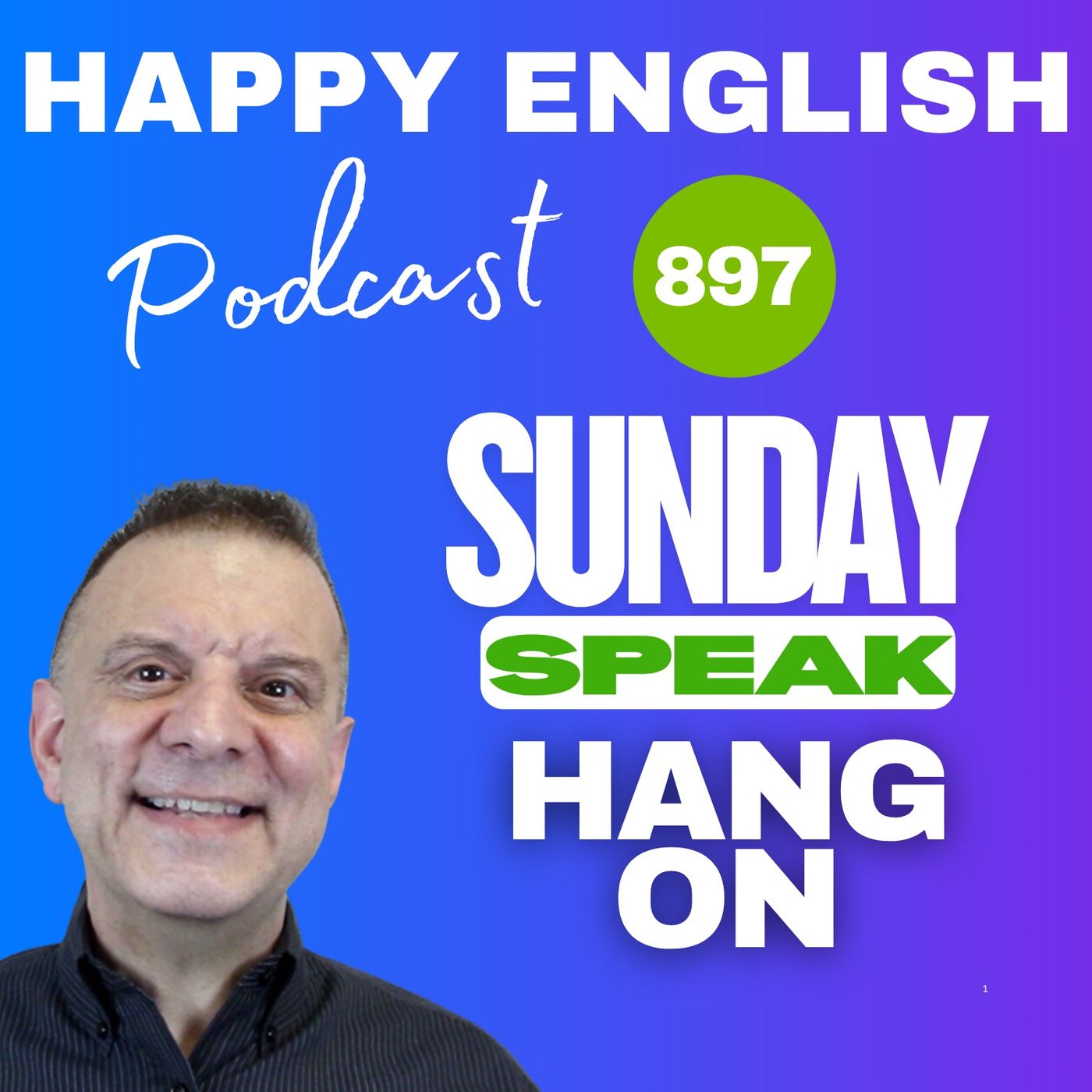
Hey there! It’s Michael here — and welcome back to another Happy English Sunday Speak. I’m here every Sunday with a quick one-point tip to help you speak English more naturally.
Sometimes, you need to ask someone to wait. In situations like this, you could say “Please wait a moment.” And sure, that’s correct English — but it sounds a bit formal and not something we usually say to friends or coworkers. In everyday conversation, we have a more natural and friendly way to ask someone to wait: “Hang on.”
Like, when you’re on the phone and need to ch...
896 - Saturday Short - Using Kind of, Sort of, and A bit To Soften Your Sentence
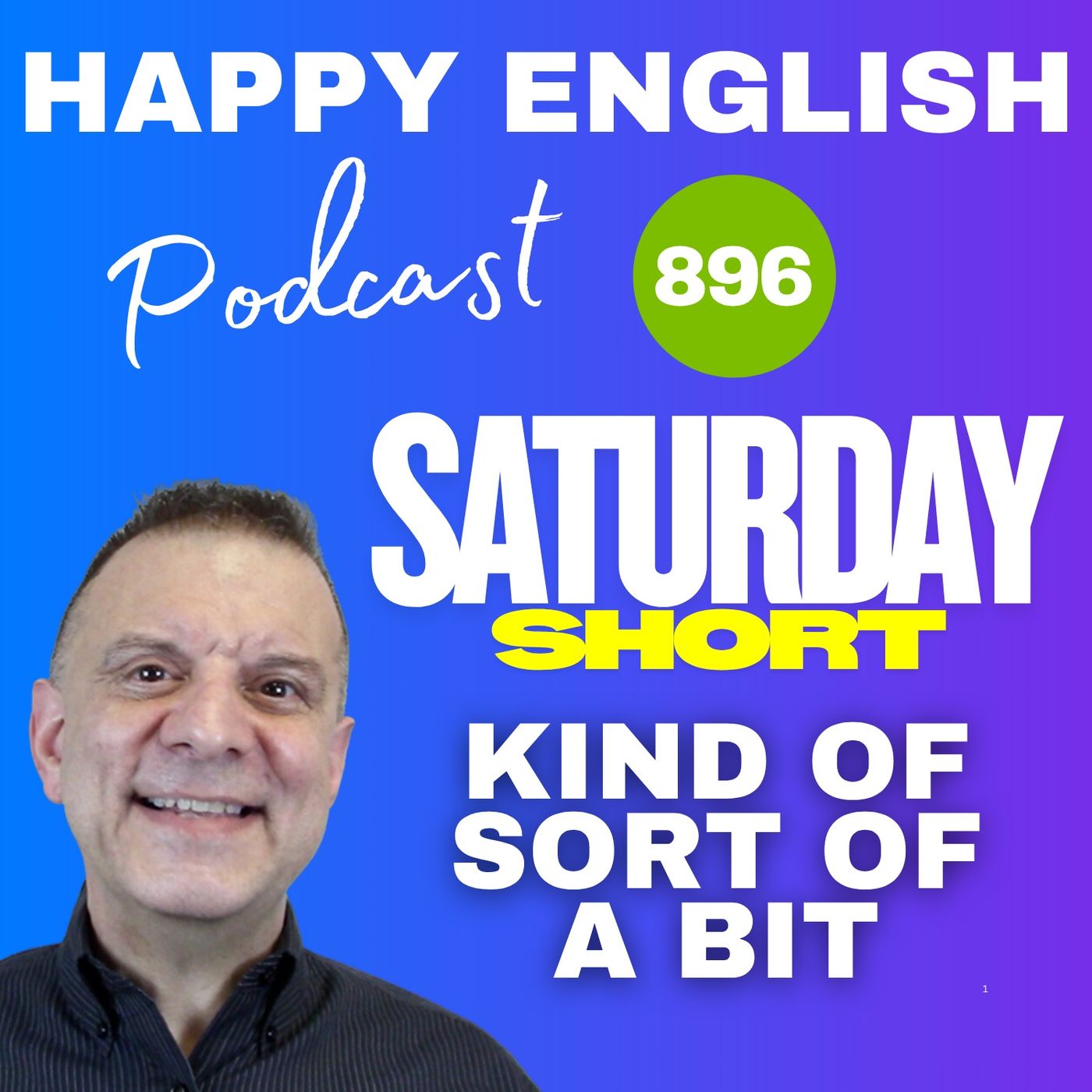
Hey there! It’s Michael here — and welcome back to another Happy English Saturday Short, your quick tip for speaking English better.
Today, let’s look at three really natural phrases: kind of, sort of, and a bit. We use these to soften what we’re saying. They make a statement sound less strong, less direct — and that makes your English sound more natural in everyday conversation.
For example, let’s say you’re tired after work. Instead of just saying, “I’m tired,” you can soften it by saying: “I’m kind of tired today.” Or: “I’m a bit tired after work.”...
895 - Friday Phrasal Verb - Using Jazz Up Make Something More Exciting
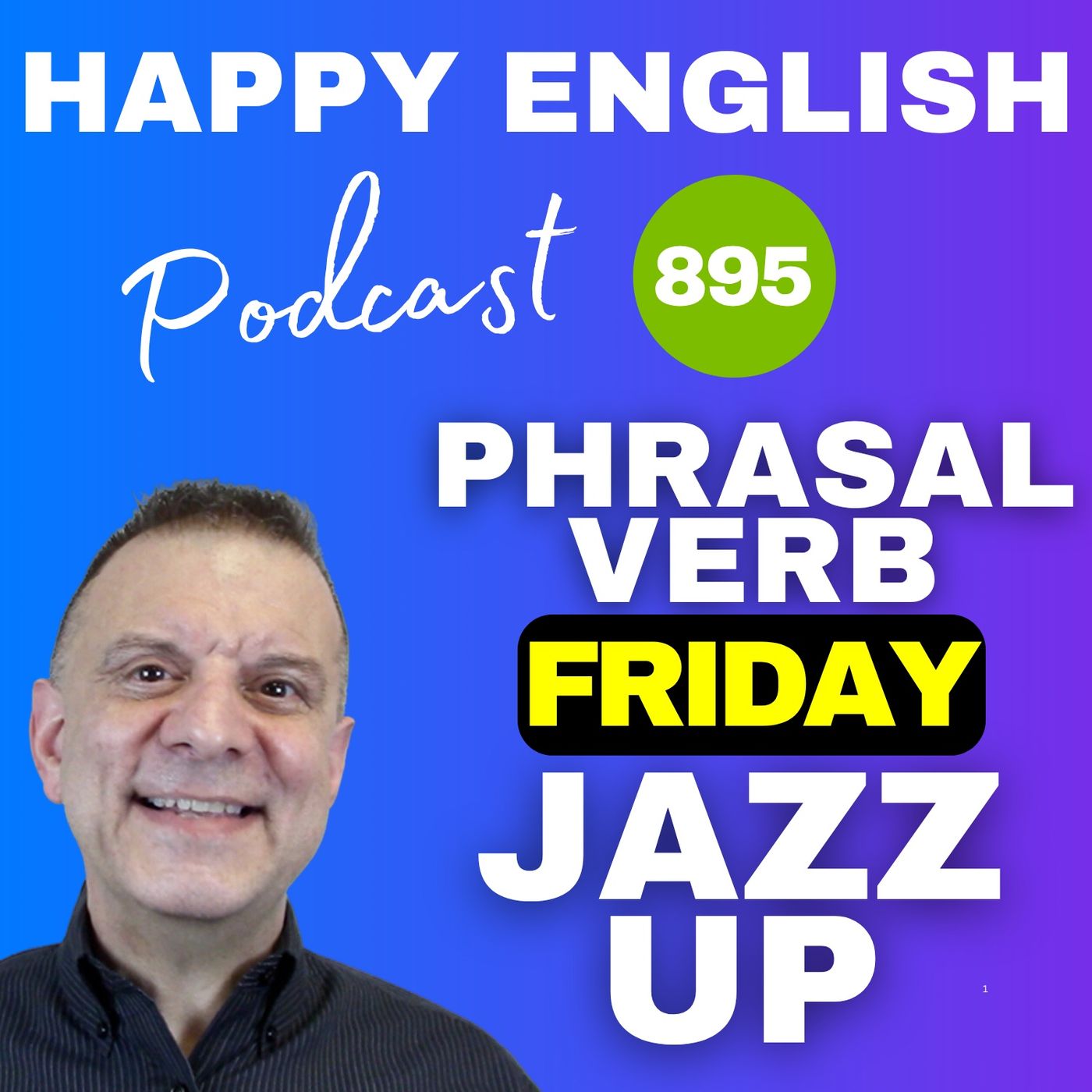
Hey there! It’s Michael here — and welcome back to another Happy English, Phrasal Verb Friday. I’m here every Friday, with a quick, one-point English lesson to help you learn one new phrasal verb and sound more natural when you speak. Today’s phrasal verb is jazz up.
When you jazz something up, it means you make it more interesting, exciting, or attractive. It’s like giving something a little extra style or energy. Like, my friend Lisa was hosting a party last weekend. She jazzed up her living room with some cool lights and a new playlist...
894 - Usage and Meaning Of "Even" In Negative Sentences
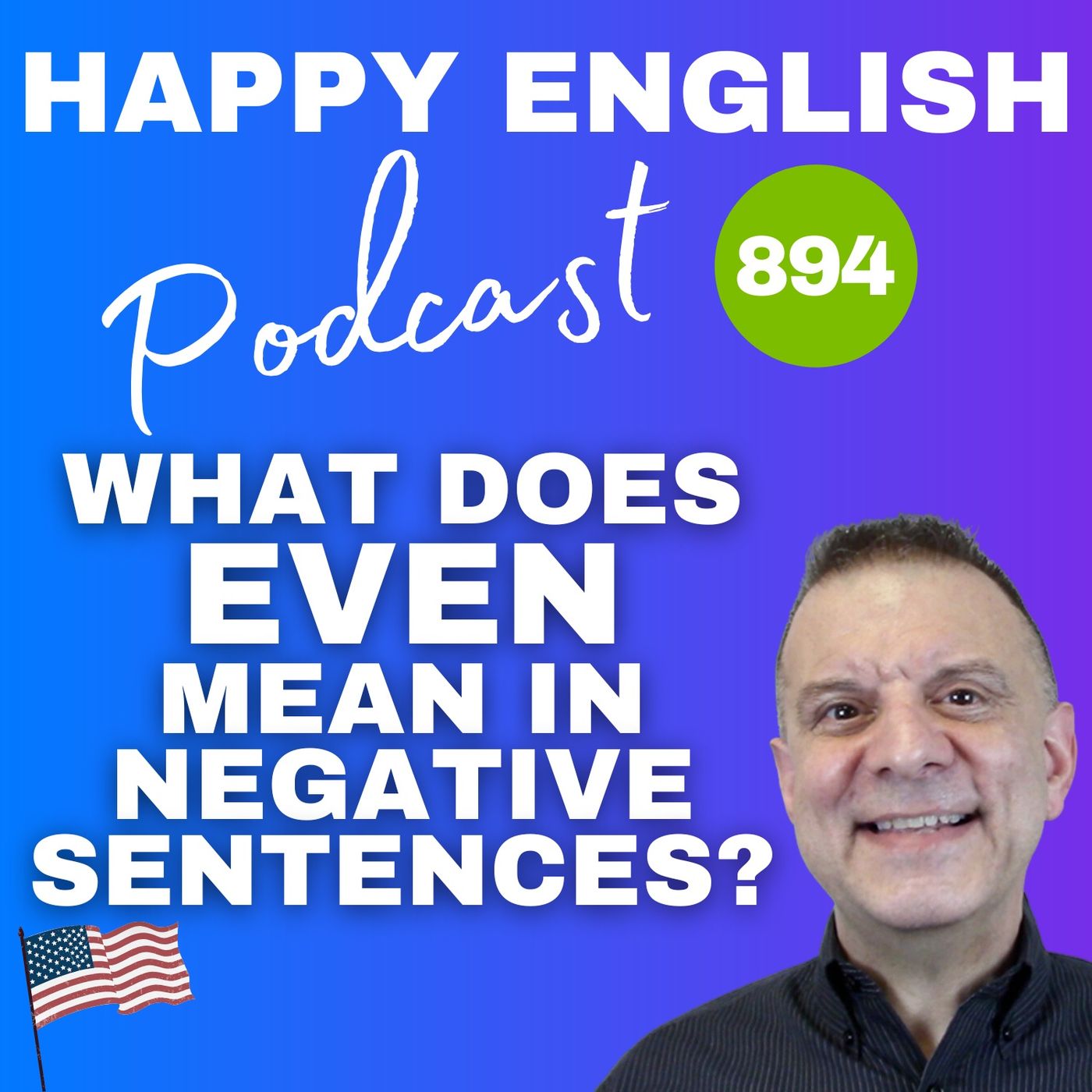
They didn’t even say thank you. Not “they didn’t say thank you.” They didn’t even say thank you. So… what’s the deal with even in negative sentences?
In Episode 880, we looked at how to use even in general - like for comparisons and emphasis. But today, we’re going to zoom in on something more specific… and honestly, something really common - using even in negative sentences.
Join my Podcast Learner's Study Group here: https://www.myhappyenglish.com/plsg
Visit my website for over 3,000 free English lessons: https://www.myhappyenglish.com/
My AI English
893 - The Difference Between So, Too, & Very In English
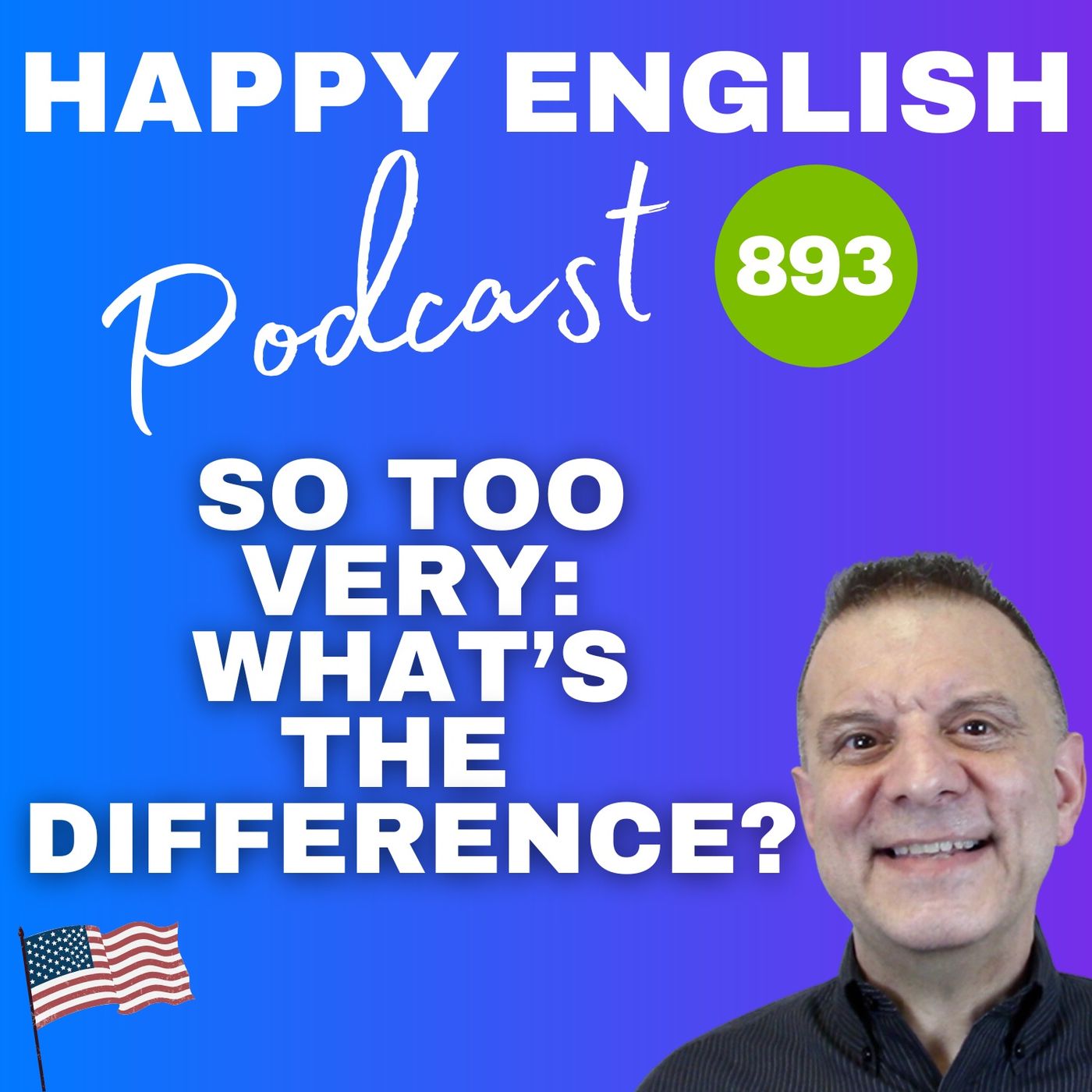
It was very cool this morning. Like around 11 degrees celsius. When I took Max for a walk I was actually surprised it was so cool. Like, there’s a nip in the air kinda cool. Boy, I’m hoping this coming winter isn’t too cold. Let’s see how it goes.
These three little words - too, very, and so - all come before adjectives, and they all talk about how much of something there is. Like, how hot, how tall, how tired… but the feeling and intention behind each word is a little different. So today, we’re goin...
892 - How To Talk About Reason Without Saying Because In English
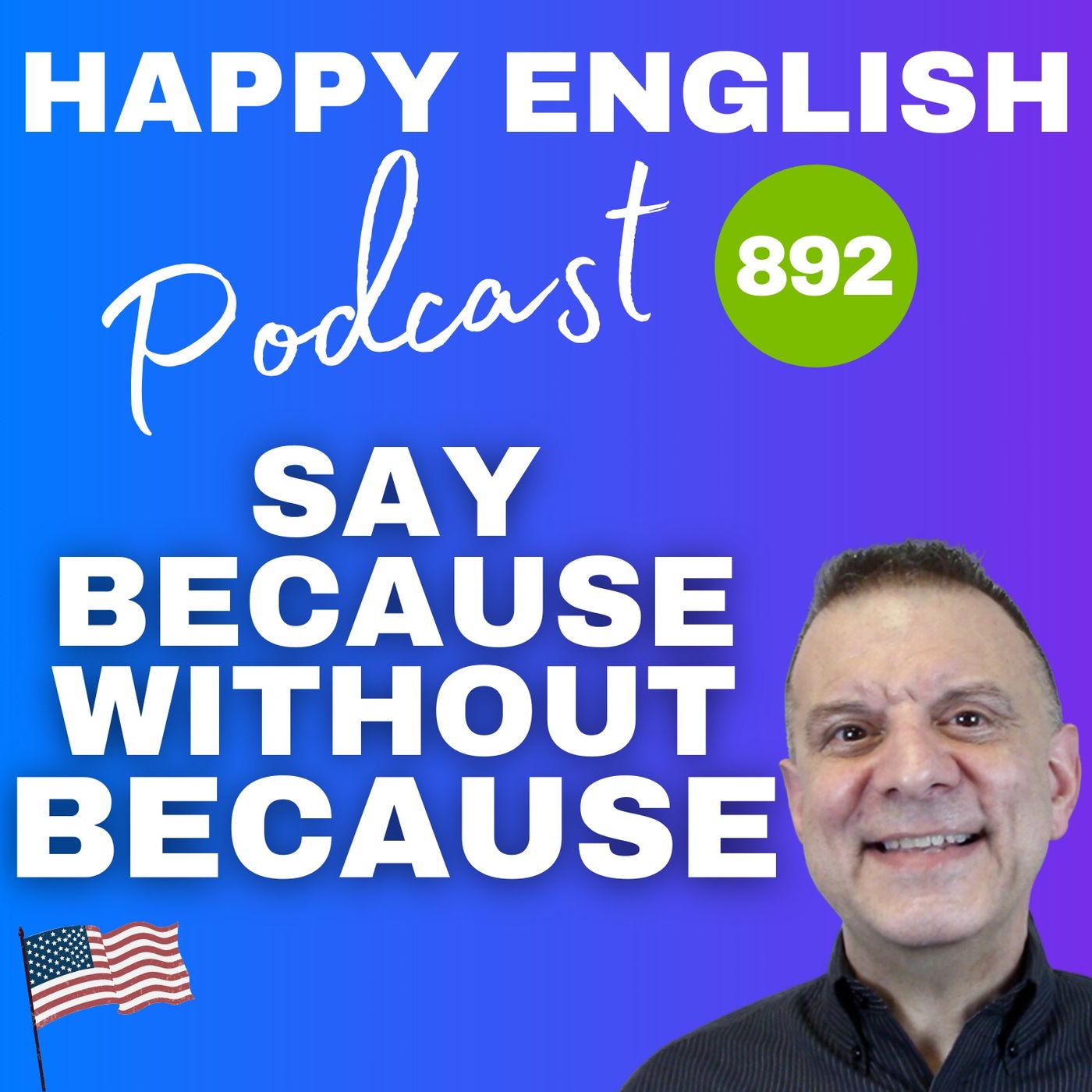
I’m so hungry. No time for lunch today. No wonder my stomach is grumbling. That’s why i decided to order a double cheeseburger and some fries...at the diner.
Because is a great word - and it’s totally correct. But when it comes to speaking naturally, we often don’t use because directly. Instead, we give the reason in a more casual, fluent way. So today, I’ll show you how native English speakers give reasons in conversation - without actually saying because.
Join my Podcast Learner's Study Group here: https://www.myhappyenglish.com/plsg
891 - Sunday Speak - Using How Come Instead Of Why
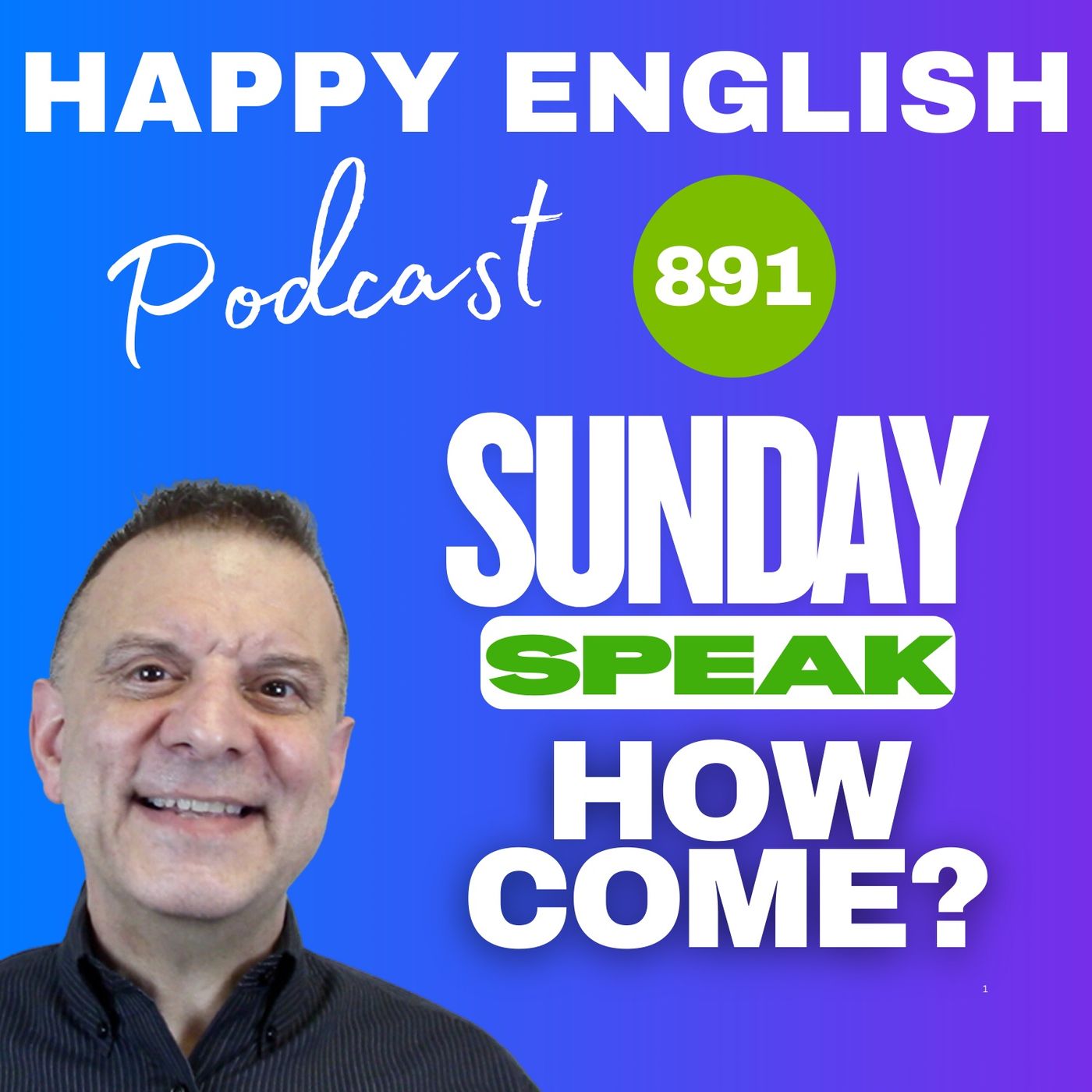
Now, when you want to ask why in English, sure, you can just say “why.” But in everyday conversation, native speakers often use a more casual phrase: “How come?” “How come” means the same as “why,” but it sounds softer, friendlier, and very conversational. And, it’s easy to use. You can use it by itself! Like, your friend says, “I’m skipping lunch today.” You can ask, “How come?” Or your coworker says, “I can’t make it to the meeting.” You can ask, “Oh really? How come?”
You can also put how come in front of any sentence to make a casual question...
890 - Saturday Short: How to Use Negative Questions Naturally in English
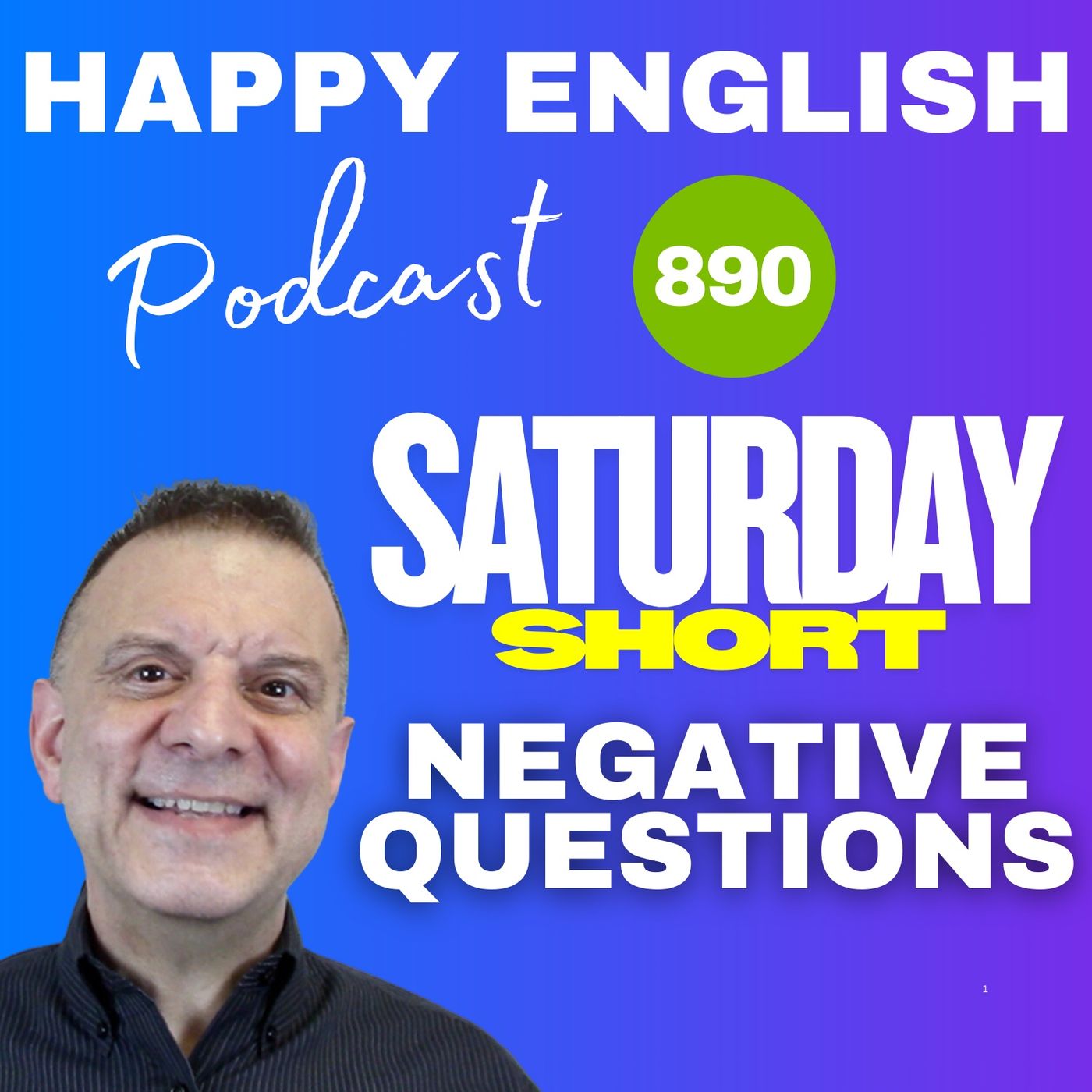
We often use a negative question like “Isn’t this…?” or “Aren’t you…?” in conversation. Technically, these are not questions for asking something. They are a casual and friendly way to confirm something or make a suggestion.
For example, if you and your friend are at the peir on a sunny day, you might say: “Isn’t this a perfect day for fishing?” You’re not really asking for information — you’re confirming what you already think. OR "Aren't these donuts delicious!”
Or if you’re making a suggestion, you can use the same pattern. Like: “It’s almost 5pm. Isn’t it better to take t...
889 - Phrasal Verb Friday - Meaning And Usage Of Slack Off In English
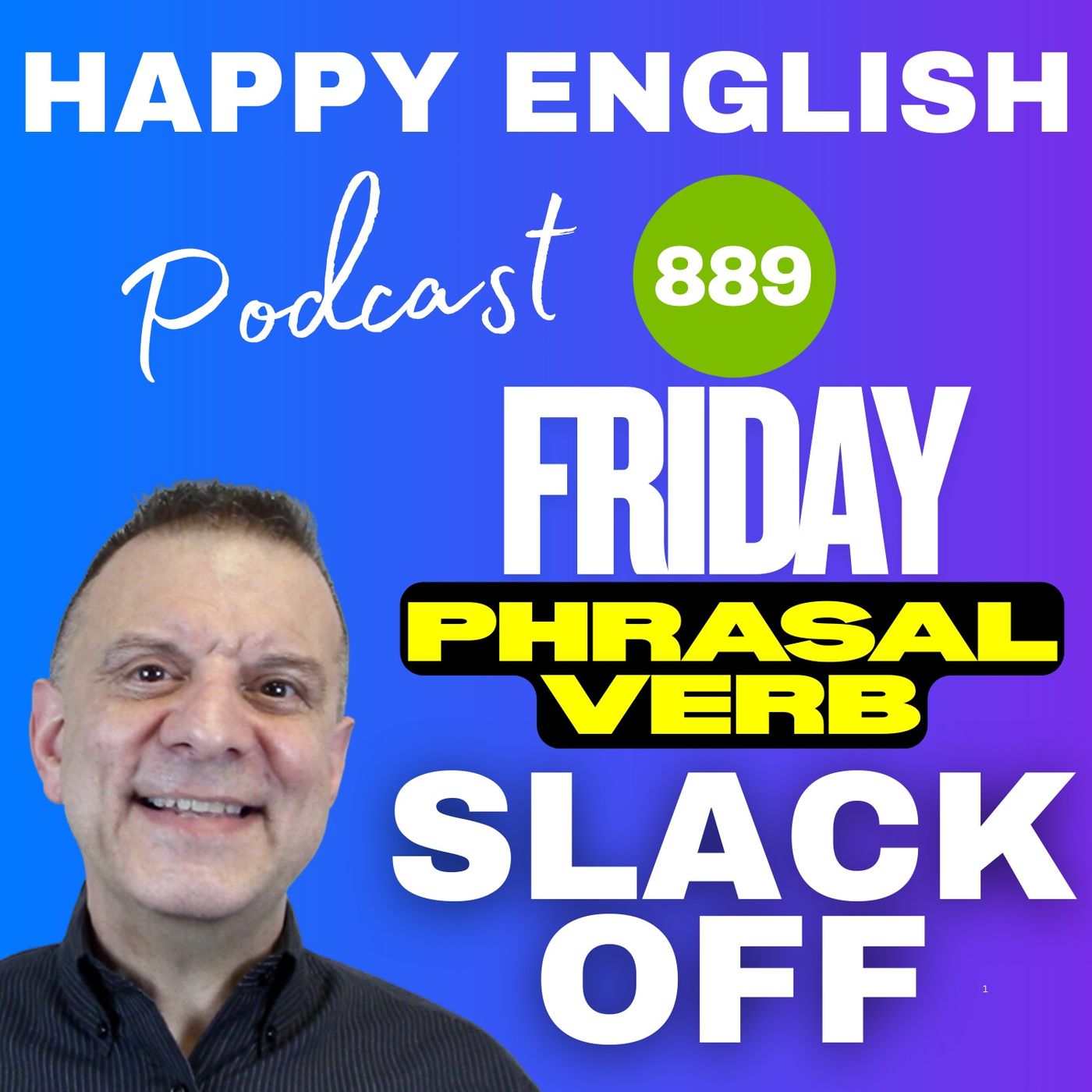
Today’s phrasal verb is slack off. When you slack off, it means you become lazy about your work, your studies, or your responsibilities. You don’t try as hard as you should.
Like, my friend Eddie started going to the gym in in July, but by the middle of this month, he really started to slack off. And in the office, Jenny was slacking off all week, so now she has to stay late to finish her project. And me? Honestly speaking, I’ve been slacking off on studying Japanese reading and writing. But now that I have Say...
888 - Using Tag & Negative Questions To Comment And Confirm In English
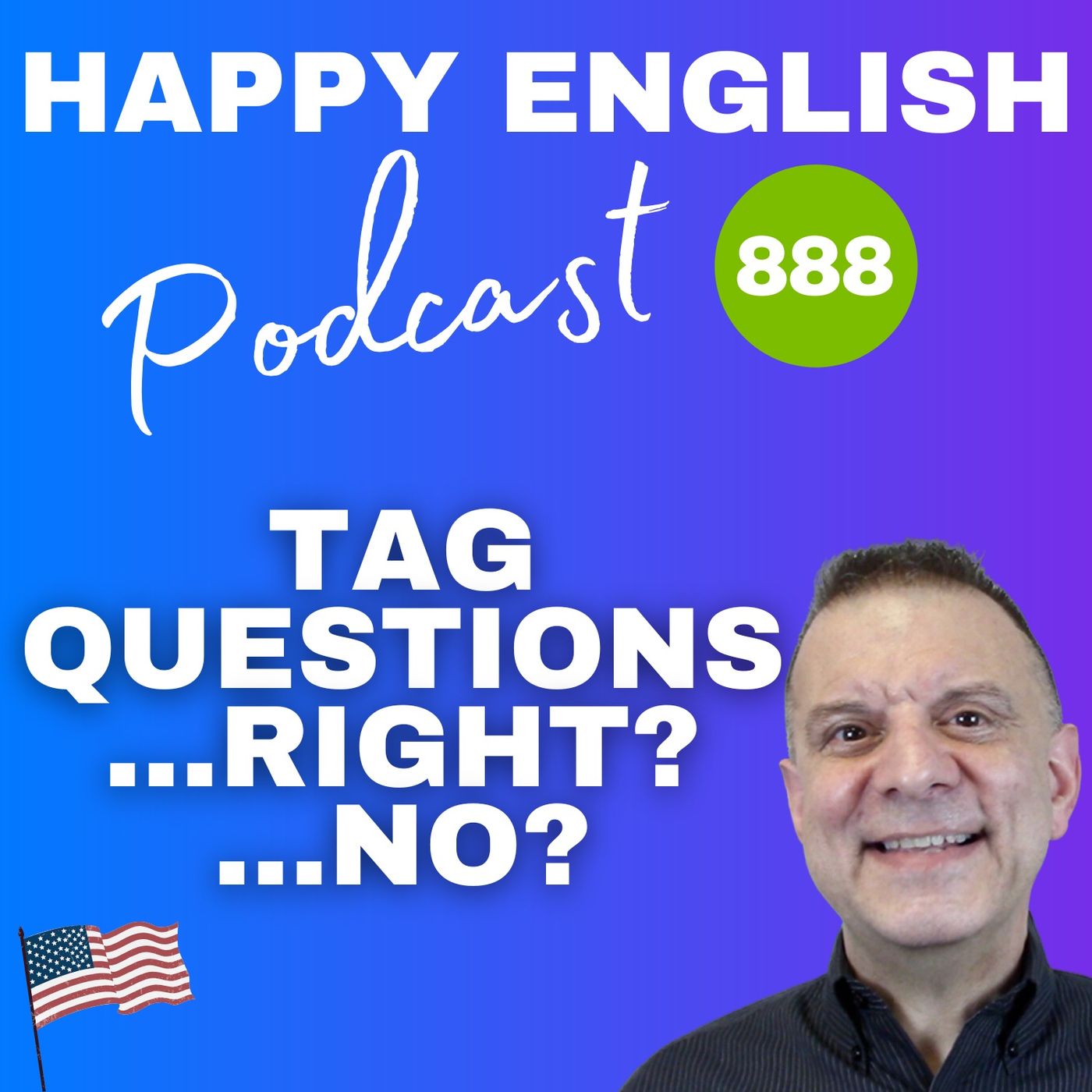
Hey, let me ask you a question - You’ve studied English grammar, haven’t you? And you’ve probably heard tag questions or negative questions before, right? Well, isn’t this going to be an interesting lesson for you!
It's a nice day, isn't it? That's a Tag Question, and today, I’ll show you how these work - and how you can use them to sound more like a native speaker.
Join my Podcast Learner's Study Group here: https://www.myhappyenglish.com/plsg
Visit my website for over 3,000 free English lessons: https://www.myhappyengli...
887 – How To Use Unless, As Long As, And In Case In English
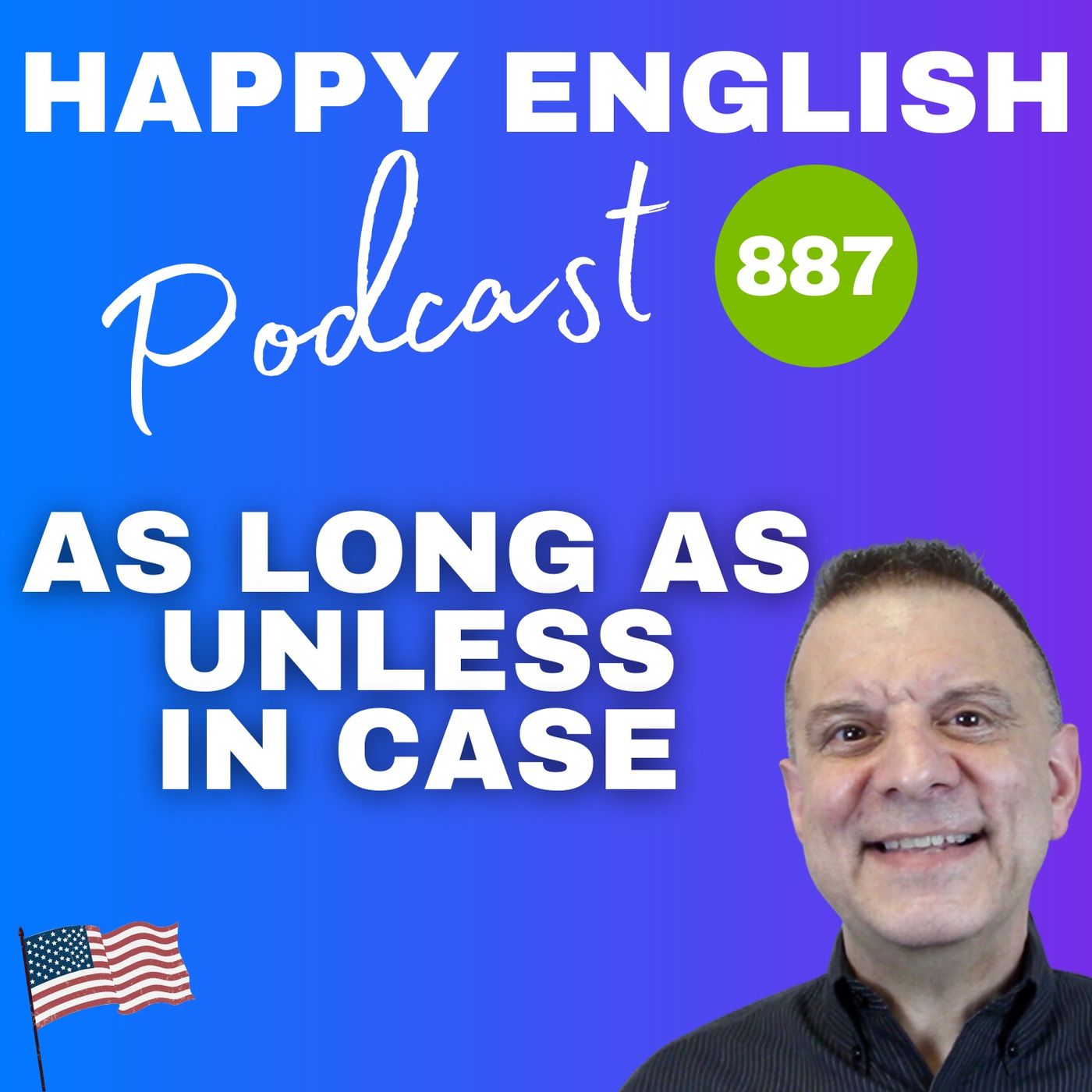
Unless you have something else to do right now, You should listen to this whole podcast episode. And as long as you’re listening, why not take notes...In case you want to use the phrases from this lesson in your daily English.
These three little phrases - unless, as long as, and in case - all help us talk about situations that might happen. But they each have a different nuance, and getting them right can make your English sound much more natural. Let's dive in!
Join my Podcast Learner's Study Group here: https://www.myh...
886 - Learn The Difference Between Have Got And Have In English
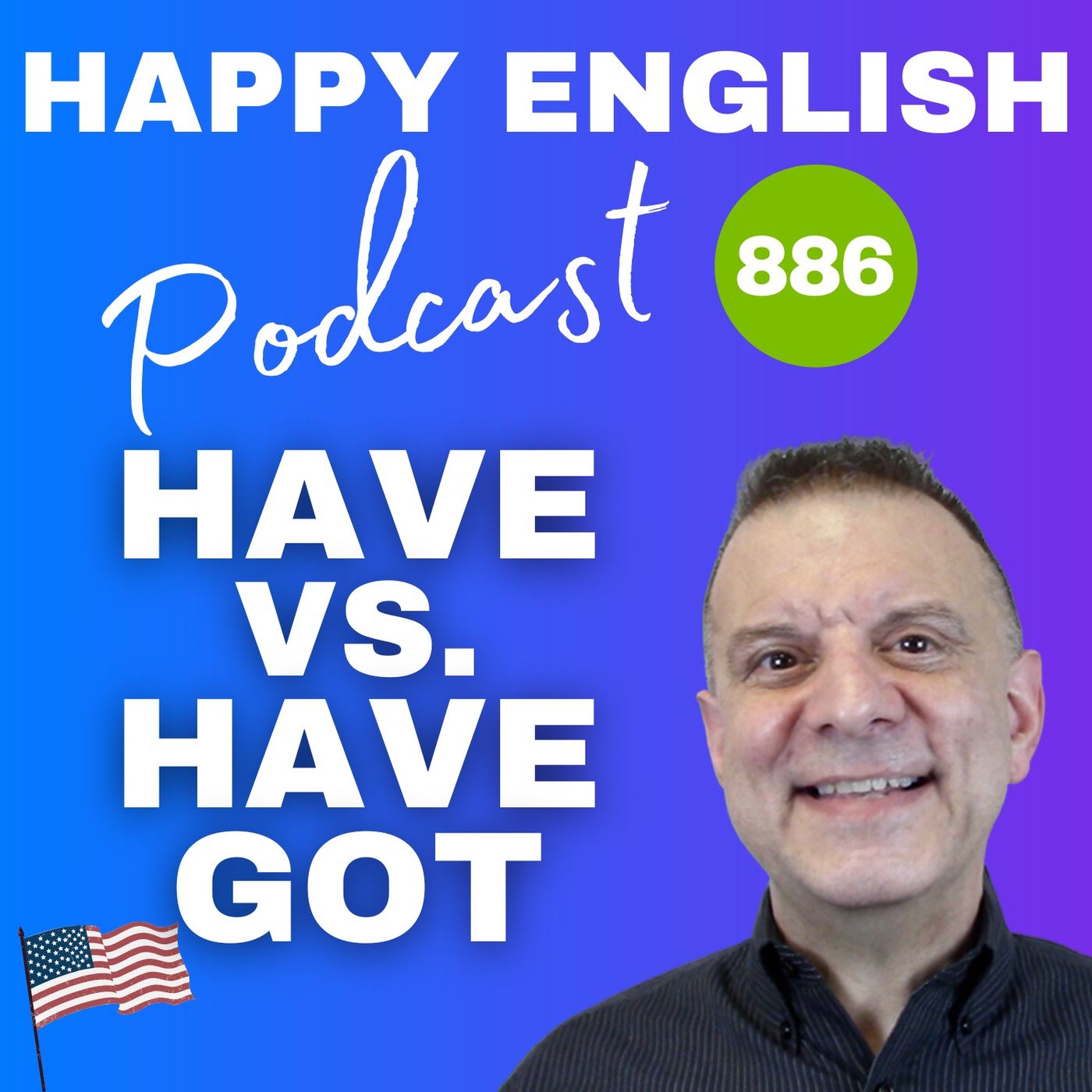
You know what? I’ve got a question for you. Or… should I say, I have a question for you? Hmm. Which one sounds better? Or… are they both OK?
For many English learners, “have got” can be a little confusing. I mean, we’ve got “I have a dog,” and “I’ve got a dog”… and both are correct? What’s going on here? Well today, we’re going to break it all down — grammar, style, and real-world usage — so you’ll know exactly how and when to use “have” and “have got.”
Join my Podcast Learner's Study Group here: https...
885 - Sunday Speak - How To Use Gotcha To Show Understanding In English
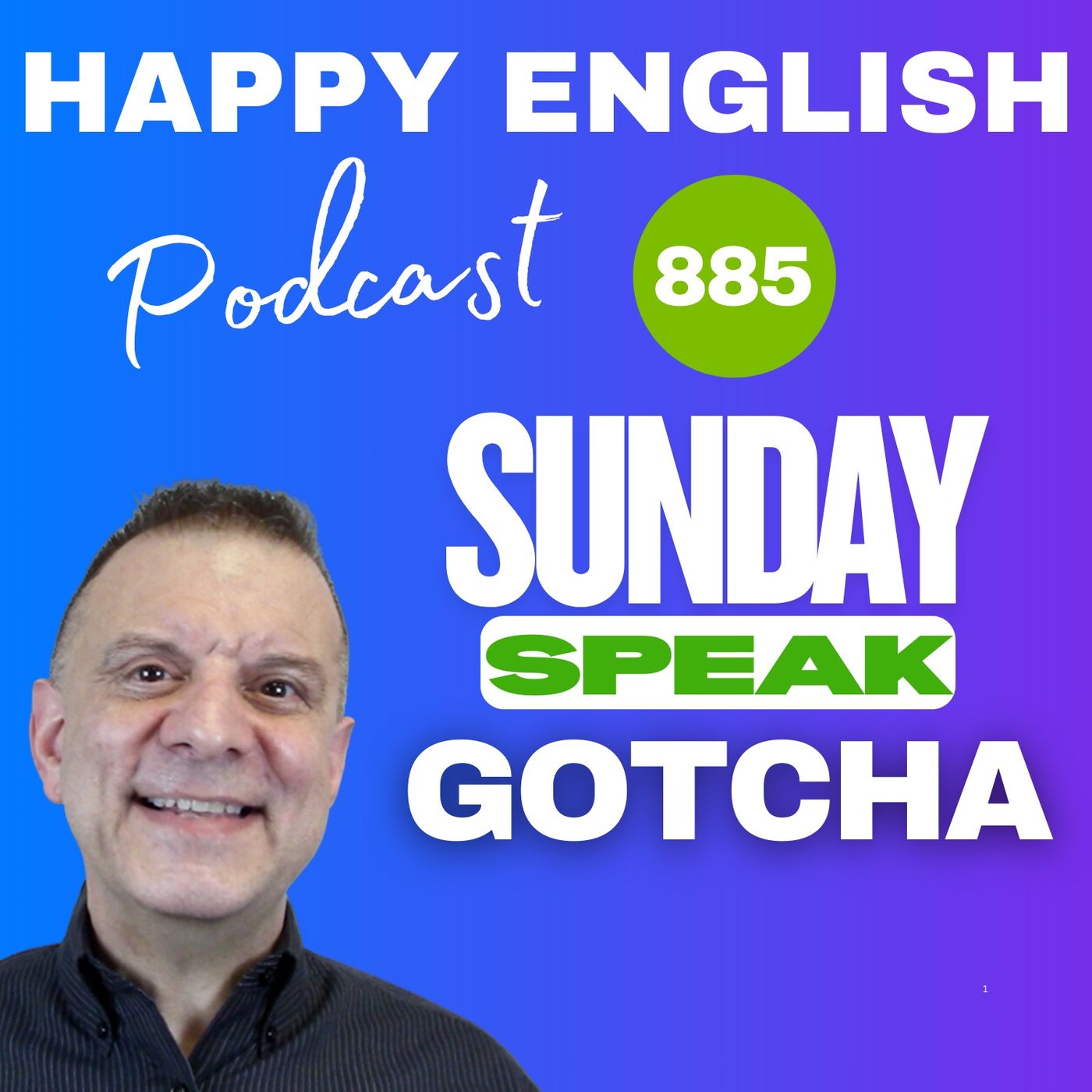
Hey there! It’s Michael here — and welcome back to another Happy English Sunday Speak. Every Sunday, I’ll be here with a quick one-point tip to help you speak English more naturally.
One thing you need to know how to do in English is to communicate that you understood what someone said. Like if someone gives you directions on the street. You could say, Oh ok, I understand. And sure, that’s correct English — but it can sound a little formal or stiff in everyday conversation. In everyday, English conversation, we use the compact form of I understand...
884 - Saturday Short - How To Use By The Way To Change The Topic In English
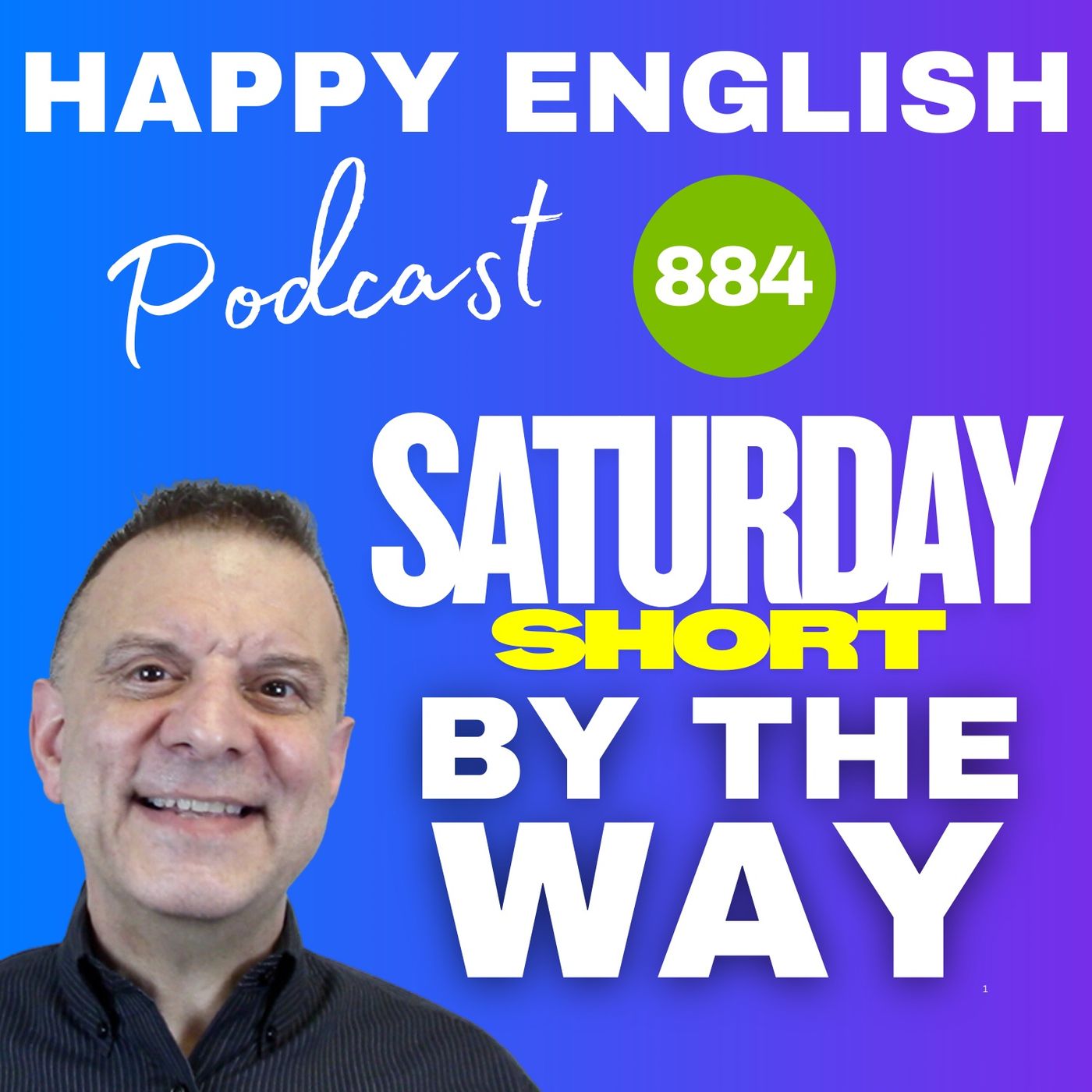
Hey there! It’s Michael here — and welcome back to another Happy English Saturday Short, your quick tip for speaking English better.
Today, let’s look at a commonly used conversational phrase is “by the way.”
We use by the way when we want to add something to the conversation, kind of like when we need to change the topic, or bringing up an extra point. It’s casual, friendly, and super common in everyday English.
Like of you’re at a party, catching up with a friend. You can say something like, “It’s great seeing you to...
883 - Phrasal Verb Friday - Learn The Meaning And Usage Of Mull Over
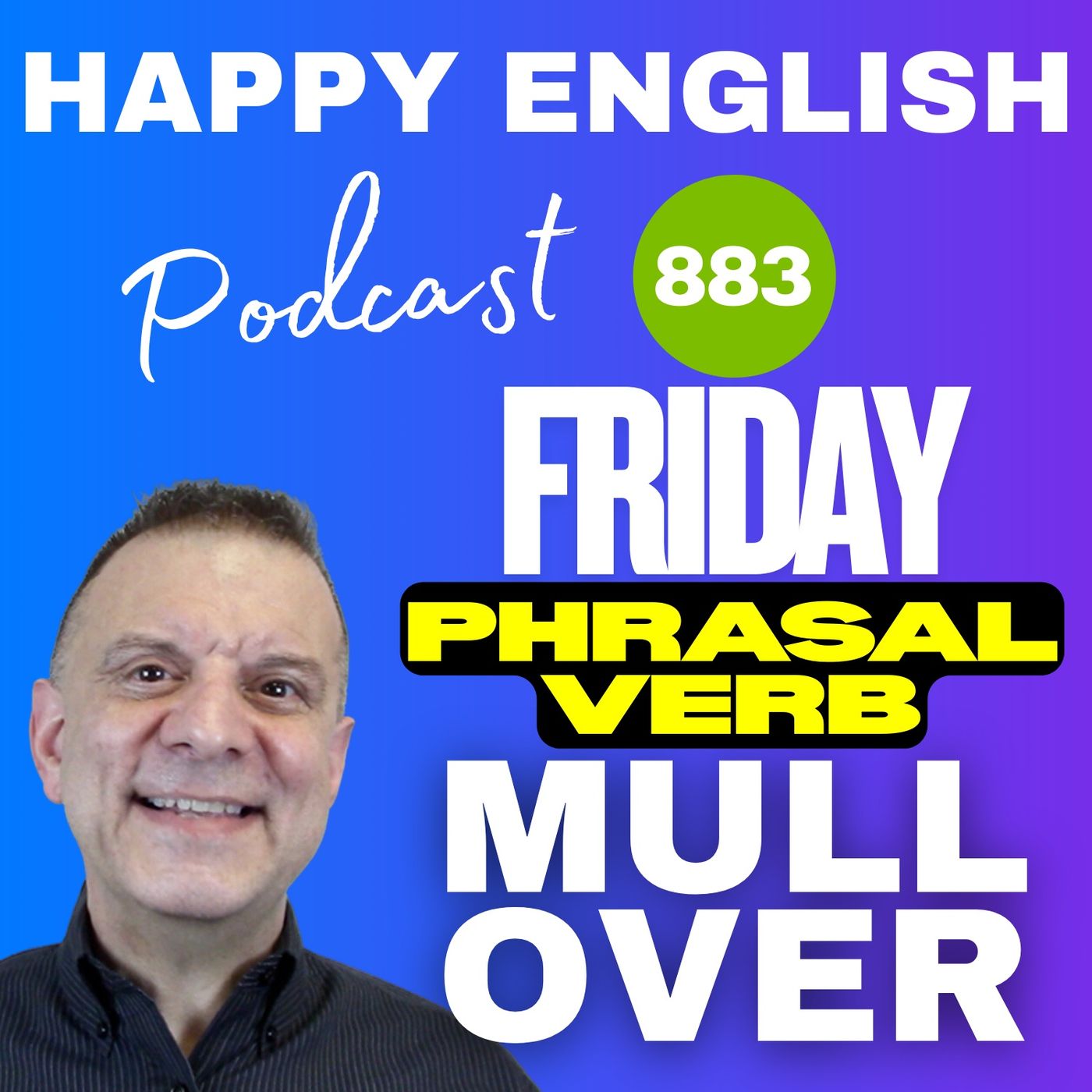
Hey there! It’s Michael here — and welcome back to another Happy English, Friday Phrasal Verb. Every Friday, I’ll be here with a quick, one-point English lesson to help you learn one new phrasal verb and sound more natural when you speak.
Last week we looked at toy with, which means to consider something not so seriously. Today’s phrasal verb is the opposite of that: mull over. When you mull something over, it means you think about it carefully before making a decision. You’re not rushing. You’re taking your time to consider the options.
Like, my...
882 - Fall Vocabulary in American English - Autumn Words and Phrases
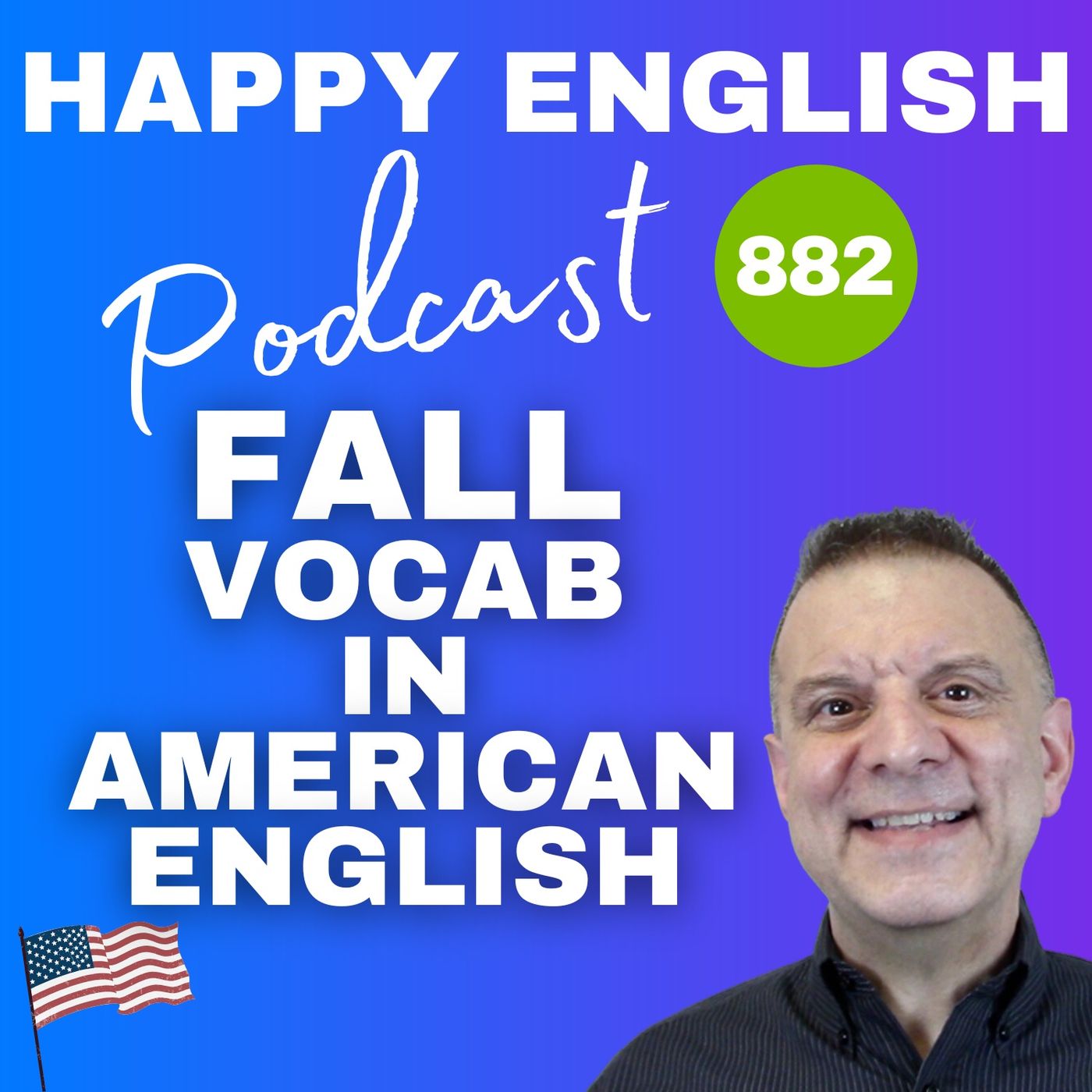
Fall is right around the corner. Soon there will be a nip in the air as you look at the harvest moon, while sipping your pumpkin spice latte. When the season changes, so does the way we talk. So today, before Indian Summer comes, let’s dive into some seasonal vocabulary and phrases that’ll help you talk about fall just like a native speaker.
Join my Podcast Learner's Study Group here: https://www.myhappyenglish.com/plsg
Visit my website for over 3,000 free English lessons: https://www.myhappyenglish.com/
My AI English Tutor is HERE
